 Liberal Faith: Essays in Honor of Philip Quinn
Paul J. Weithman
University of Notre Dame Press, 2008
Philip Quinn, John A. O’Brien Professor at the University of Notre Dame from 1985 until his death in 2004, was well known for his work in the philosophy of religion, political philosophy, and core areas of analytic philosophy. Although the breadth of his interests was so great that it would be virtually impossible to identify any subset of them as representative, the contributors to this volume provide an excellent introduction to, and advance the discussion of, some of the questions of central importance to Quinn in the last years of his working life.
Paul J. Weithman argues in his introduction that Quinn’s interest and analyses in many areas grew out of a distinctive and underlying sensibility that we might call “liberal faith.” It included belief in the value of a liberal education and in rigorous intellectual inquiry, the acceptance of enduring religious, cultural, and political pluralism, along with a keen awareness of problems posed by pluralism, and a deeply held but non-utopian faith in liberal democratic politics. These provocative essays, at the cutting edge of epistemology, the philosophy of religion, philosophical theology, and political philosophy, explore the tenets of liberal faith and invite continuing engagement with the philosophical issues.
“Philip Quinn was admired enormously throughout the world of professional philosophy . . . . His reputation for rigor, his tireless service to the profession, and his essentially ‘non-dogmatic,’ but philosophically sophisticated faith is widely admired . . . The essays in this volume are first-rate contemporary philosophy along with an excellent introduction to Quinn’s work.” —Charles Taliaferro, St. Olaf College
"The papers that form Liberal Faith give insightful treatments of three types of questions: first, how can we conscientiously believe something when there are many people we admire who do not believe it, and what is the underlying relation here between justification and rationality; second, what does it mean to desire union with God, and can Christians properly believe in the possibility of eternal self-annihilation; third, how should liberal democracy accommodate the religious convictions of its members, whether some comprehensive doctrine such as a religion is required to justify a commitment to human equality, and whether there is an absolute moral prohibition on the state use of torture. The volume has an unusually good introduction putting the papers into dialog with each other and with the work of Philip Quinn. The papers are cohesive because the central themes of Philip Quinn's work hold together into a picture of how Christianity and Liberal Democracy fit together." —John Hare, Noah Porter Professor of Philosophical Theology, Yale Divinity School
“This is a collection of high quality essays dealing with various topics related to Philip Quinn’s work. The book makes an original contribution by virtue of its individual papers, each of which is new. These essays will be of interest to scholars and students who followed Quinn’s work, especially in philosophy of religion and political philosophy.“ —John Greco, The Leonard and Elizabeth Eslick Chair in Philosophy, Saint Louis University
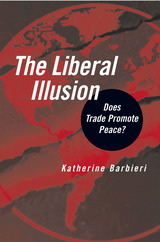 The Liberal Illusion: Does Trade Promote Peace?
Katherine Barbieri
University of Michigan Press, 2005 "A very important and long-awaited major contribution to the debate . . . Her work cannot be ignored."
--Nils Petter Gleditsch, Journal of Peace Research
"Barbieri builds on a solid foundation of work on trade and conflict and specifies the conditions under which trade reduces and increases conflict. . . . The bottom line is that this is an important book in the study of trade and conflict because of its comprehensive approach."
--Kathy L. Powers, Perspectives on Politics
"Barbieri's analysis reveals the fundamental and intellectual weaknesses of the various arguments on this topic. [A] solid and timely contribution to the literature"
--Choice
The Liberal Illusion sheds light on an increasingly important question in international relations scholarship and the domain of policy making-whether international trade promotes peace. By examining a broad range of theories about trade's impact on interstate relations and undertaking a set of empirical analyses of the trade-conflict puzzle, Katherine Barbieri provides a comprehensive assessment of the liberal view that trade promotes peace. Barbieri's stunning conclusions depart from conventional wisdom in international relations. Consequently, The Liberal Illusion serves as an important counterargument and a warning call to policymakers who rely upon trade-based strategies to promote peace, strategies that appear to offer little hope of achieving their goals.
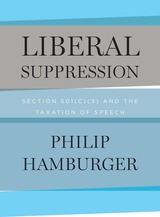 Liberal Suppression: Section 501(c)(3) and the Taxation of Speech
Philip Hamburger
University of Chicago Press, 2018 In the course of exempting religious, educational, and charitable organizations from federal income tax, section 501(c)(3) of the Internal Revenue Code requires them to refrain from campaign speech and much speech to influence legislation. These speech restrictions have seemed merely technical adjustments, which prevent the political use of a tax subsidy. But the cultural and legal realities are more disturbing.
Tracing the history of American liberalism, including theological liberalism and its expression in nativism, Hamburger shows the centrality of turbulent popular anxieties about the Catholic Church and other potentially orthodox institutions. He argues persuasively that such theopolitical fears about the political speech of churches and related organizations underlay the adoption, in 1934 and 1954, of section 501(c)(3)’s speech limits. He thereby shows that the speech restrictions have been part of a broad majority assault on minority rights and that they are grossly unconstitutional.
Along the way, Hamburger explores the role of the Ku Klux Klan and other nativist organizations, the development of American theology, and the cultural foundations of liberal “democratic” political theory. He also traces important legal developments such as the specialization of speech rights and the use of law to homogenize beliefs. Ultimately, he examines a wide range of contemporary speech restrictions and the growing shallowness of public life in America.
His account is an unflinching look at the complex history of American liberalism and at the implications for speech, the diversity of belief, and the nation’s future.
 A Liberal Tide?: Immigration and Asylum Law and Policy in Latin America
Edited by David James Cantor, Luisa Feline Freier, and Jean-Pierre Gauci
University of London Press, 2015 Over the past decade, a paradigm shift in migration and asylum law and policymaking appears to have taken place in Latin America. Does this apparent ""liberal tide"" of new laws and policies suggest a new approach to the hot topics of migration and refugees in Latin America distinct from the regressive and restrictive attitudes on display in other parts of the world? The question is urgent not only for our understanding of contemporary Latin America but also as a means of reorienting the debate in the migration studies field toward the important developments currently taking place in the region and in other parts of the global south. This book brings together eight varied and vibrant new analyses by scholars from Latin America and beyond to form the first collection that describes and critically examines the new liberalism in Latin American law and policy on migration and refugees.
Liberalism
John Gray
University of Minnesota Press, 1995 Since the publication in 1986 of the first edition of Liberalism, both the world and the author’s views have changed significantly. In this new edition, John Gray argues that whereas liberalism was the political theory of modernity, it is ill-equipped to cope with the dilemmas of the postmodern condition. The task now, as Gray sees it, is to develop a pluralist theory, in which the liberal problem of finding a modus vivendi among rival communities and worldviews is solved in postliberal terms. Copublished with Open University Press
Liberalism After Communism: The Implications of the 1993 Elections to the Federal Assembly
Jerzy Szacki
Central European University Press, 1995 This study is devoted to recent developments in Central European (especially Polish) political thought, and concentrates on the emergence of liberal ideas, a subject largely neglected by Western observers. It provides a clear account of protoliberal and liberal thinking in Central Europe both before and after 1989, a critical appraisal of the democratic opposition to communism, and an analysis of economic liberalism as its rival orientation. The author examines the changes which occur in classical liberal ideas when they are implemented in a region with practically no liberal tradition and no socioeconomic infrastructure, and shows how liberal ideas in Central Europe are becoming constructivist, functioning as the ideological justification for a new kind of Utopian social engineering that aims at constructing capitalism.
Liberalism Ancient and Modern
Leo Strauss
University of Chicago Press, 1995 Revered and reviled, Leo Strauss has left a rich legacy of work that continues to spark discussion and controversy. This volume of essays ranges over critical themes that define Strauss's thought: the tension between reason and revelation in the Western tradition, the philsophical roots of liberal democracy, and especially the conflicting yet complementary relationship between ancient and modern liberalism. For those seeking to become acquainted with this provocative thinker, one need look no further.
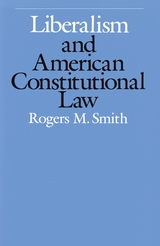 Liberalism and American Constitutional Law
Rogers M. Smith
Harvard University Press Rogers Smith describes the adverse influence of modern liberalism's governing ideas on the development of American constitutional law and offers a new, more purposive theory to suit contemporary needs. He begins with a fresh analysis of the liberal goals shared by America's constitutional framers and points out the weaknesses of their political thought. Examining vital constitutional doctrines of due process, free speech, voting apportionment, and economic welfare, he demonstrates how contemporary law is often an incoherent patchwork of principles drawn from different historic versions of liberalism.
Smith considers and discards the major modern theories in political philosophy that bear on constitutional law: the democratic relativism of Alexander Bickel and John Hart Ely, the higher-law views inherited from America's religious traditions, and the neo-Kantian liberalism of Ronald Dworkin and John Rawls. Returning instead to the early liberalism of John Locke, he suggests how a theory centered on the Enlightenment commitment to promoting human capacities for reflective self-direction, or “rational liberty,” might better guide current constitutional debates.
 Liberalism and American Constitutional Law
Rogers M. Smith
Harvard University Press, 1985 Rogers Smith describes the adverse influence of modern liberalism's governing ideas on the development of American constitutional law and offers a new, more purposive theory to suit contemporary needs. He begins with a fresh analysis of the liberal goals shared by America's constitutional framers and points out the weaknesses of their political thought. Examining vital constitutional doctrines of due process, free speech, voting apportionment, and economic welfare, he demonstrates how contemporary law is often an incoherent patchwork of principles drawn from different historic versions of liberalism.
Smith considers and discards the major modern theories in political philosophy that bear on constitutional law: the democratic relativism of Alexander Bickel and John Hart Ely, the higher-law views inherited from America's religious traditions, and the neo-Kantian liberalism of Ronald Dworkin and John Rawls. Returning instead to the early liberalism of John Locke, he suggests how a theory centered on the Enlightenment commitment to promoting human capacities for reflective self-direction, or “rational liberty,” might better guide current constitutional debates.
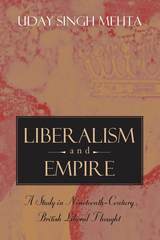 Liberalism and Empire: A Study in Nineteenth-Century British Liberal Thought
Uday Singh Mehta
University of Chicago Press, 1999 We take liberalism to be a set of ideas committed to political rights and self-determination, yet it also served to justify an empire built on political domination. Uday Mehta argues that imperialism, far from contradicting liberal tenets, in fact stemmed from liberal assumptions about reason and historical progress. Confronted with unfamiliar cultures such as India, British liberals could only see them as backward or infantile. In this, liberals manifested a narrow conception of human experience and ways of being in the world.
Ironically, it is in the conservative Edmund Burke—a severe critic of Britain's arrogant, paternalistic colonial expansion—that Mehta finds an alternative and more capacious liberal vision. Shedding light on a fundamental tension in liberal theory, Liberalism and Empire reaches beyond post-colonial studies to revise our conception of the grand liberal tradition and the conception of experience with which it is associated.
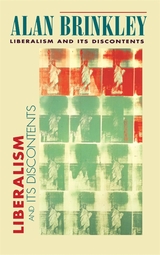 Liberalism and Its Discontents
Alan Brinkley
Harvard University Press, 2000 How did liberalism, the great political tradition that from the New Deal to the 1960s seemed to dominate American politics, fall from favor so far and so fast? In this history of liberalism since the 1930s, a distinguished historian offers an eloquent account of postwar liberalism, where it came from, where it has gone, and why. The book supplies a crucial chapter in the history of twentieth-century American politics as well as a valuable and clear perspective on the state of our nation's politics today.
Liberalism and Its Discontents moves from a penetrating interpretation of Franklin D. Roosevelt and the New Deal to an analysis of the profound and frequently corrosive economic, social, and cultural changes that have undermined the liberal tradition. The book moves beyond an examination of the internal weaknesses of liberalism and the broad social and economic forces it faced to consider the role of alternative political traditions in liberalism's downfall. What emerges is a picture of a dominant political tradition far less uniform and stable--and far more complex and contested--than has been argued. The author offers as well a masterly assessment of how some of the leading historians of the postwar era explained (or failed to explain) liberalism and other political ideologies in the last half-century. He also makes clear how historical interpretation was itself a reflection of liberal assumptions that began to collapse more quickly and completely than almost any scholar could have imagined a generation ago. As both political history and a critique of that history, Liberalism and Its Discontents, based on extraordinary essays written over the last decade, leads to a new understanding of the shaping of modern America.
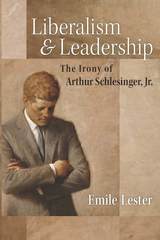 Liberalism and Leadership: The Irony of Arthur Schlesinger, Jr.
Emile Lester
University of Michigan Press, 2019 Most scholars and pundits today view Franklin Delano Roosevelt and John F. Kennedy as aggressive liberal leaders, while viewing Schlesinger’s famous histories of their presidencies as celebrations of their steadfast progressive leadership. A more careful reading of Schlesinger’s work demonstrates that he preferred an ironic political outlook emphasizing the virtues of restraint, patience, and discipline. For Schlesinger, Roosevelt and Kennedy were liberal heroes and models as much because they respected the constraints on their power and ideals as because they tested traditional institutions and redefined the boundaries of presidential power.
Aggressive liberalism involves the use of inspirational rhetoric and cunning political tactics to expand civil liberties and insure economic equality. Schlesinger’s emphasis on the crucial role that irony has played and should play in liberalism poses a challenge to the aggressive liberalism advocated by liberal activists, political thinkers, and pundits. That his counsel was grounded in conservative insights as well as liberal values makes it accessible to leaders across the political spectrum.
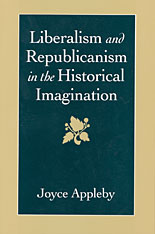 Liberalism and Republicanism in the Historical Imagination
Joyce Appleby
Harvard University Press, 1992 Like dye cast into water, liberal assumptions color everything American, from ideas about human nature to fears about big government. Not the dreaded “L” word of the 1988 presidential campaign, liberalism in its historical context emerged from the modern faith in free inquiry, natural rights, economic liberty, and democratic government. Expressed in the nation-building acts of revolution and constitution-writing, liberalism both structured and limited Americans’ sense of reality for two centuries.
The nation’s scholars were unable to break away from liberalism’s pervasive hold on the American mind until the last generation—when they recovered the lost world of classical republicanism. Ornate, aristocratic, prescriptive, and concerned with the common good, this form of republicanism held sway among the founding fathers before the triumph of liberal thought, with its simple, egalitarian, rational, and individualistic emphasis. The two concepts, as Joyce Appleby shows, posed choices for eighteenth-century thinkers much as they have divided twentieth-century scholars.
Entering one of the liveliest debates in the scholarly world about our ideological roots, Appleby follows the labyrinthine controversies that these two perspectives have generated in their day and in ours. In doing so, she addresses the tensions that remain to be resolved in the democratic societies of the late twentieth century—the complex relations between individual and community, personal liberty and the common good, aspiration and practical wisdom.
 Liberalism and the Culture of Security: The Nineteenth-Century Rhetoric of Reform
Katherine Henry
University of Alabama Press, 2011 Normal0falsefalsefalseMicrosoftInternetExplorer4 Figures of protection and security are everywhere in American public discourse, from the protection of privacy or civil liberties to the protection of marriage or the unborn, and from social security to homeland security. Liberalism and the Culture of Security traces a crucial paradox in historical and contemporary notions of citizenship: in a liberal democratic culture that imagines its citizens as self-reliant, autonomous, and inviolable, the truth is that claims for citizenship—particularly for marginalized groups such as women and slaves—have just as often been made in the name of vulnerability and helplessness. Katherine Henry traces this turn back to the eighteenth-century opposition of liberty and tyranny, which imagined our liberties as being in danger of violation by the forces of tyranny and thus in need of protection. She examines four particular instances of this rhetorical pattern. The first chapters show how women’s rights and antislavery activists in the antebellum era exploited the contradictions that arose from the liberal promise of a protected citizenry: first by focusing primarily on arguments over slavery in the 1850s that invoke the Declaration of Independence, including Harriet Beecher Stowe’s fiction and Frederick Douglass’s “Fourth of July” speech; and next by examining Angelina Grimké’s brief but intense antislavery speaking career in the 1830s. New conditions after the Civil War and Emancipation changed the way arguments about civic inclusion and exclusion could be advanced. Henry considers the issue of African American citizenship in the 1880s and 1890s, focusing on the mainstream white Southern debate over segregation and the specter of a tyrannical federal government, and then turning to Frances E. W. Harper’s fictional account of African American citizenship in Iola Leroy. Finally, Henry examines Henry James’s 1886 novel The Bostonians, in which arguments over the appropriate role of women and the proper place of the South in post–Civil War America are played out as a contest between Olive Chancellor and Basil ransom for control over the voice of the eloquent girl Verena Tarrant.
 Liberalism and the Moral Life
Nancy L. Rosenblum
Harvard University Press, 1989 In the 1988 U.S. presidential campaign the word “liberal” was bandied about as though it were a term of abuse. Charges hurled from the political right and left accused liberalism of moral failing: liberalism lacks concern for good character and civic virtue; its preoccupation with private liberty and toleration is morally anemic and ultimately erodes shared public values. Against this background, philosophers and political theorists take stock of the historical varieties of liberal thought and of the present relation between liberalism and moral living.
Liberalism and the Moral Life presents the timely thoughts of twelve prominent scholars who are redrawing the map of liberalism: Richard Ashcraft, Benjamin R. Barber, Seyla Benhabib, William Galston, Amy Gutmann, Stephen Holmes, George Kateb, Steven Lukes, Susan Moller Okin, Nancy Rosenblum, Judith N. Shklar, and Charles Taylor. In essays that go beyond the conventional defense of liberalism based on moral skepticism or the possibility of discovering neutral principles, these writers consider possibilities for reinspiriting liberal thought. They offer fresh arguments for the moral status of individualism and argue that distinctively liberal virtues and practices sustain democracy, constituting a moral life that people share in common. Moving beyond theory, the authors point to a variety of institutional contexts within liberal democracy that provide moral education and opportunities for expressing commitment to substantive moral values.
 Liberalism and the Postcolony: Thinking the State in 20th-Century Philippines
Lisandro E. Claudio
National University of Singapore Press, 2017 The Philippines entered the twentieth century newly free of Spanish rule and faced with the task of building a nation. Due in part to American control of the country for the first half of the twentieth century, liberalism played a dynamic role in shaping the government and philosophy of the Philippines.
Through the biographies of four Filipino scholar-bureaucrats—Camilo Osias, Salvador Araneta, Carlos P. Romulo, and Salvador P. Lopez—Lisandro E. Claudio argues that liberal thought served as the grammar of Filipino democracy in the twentieth century. Melding political philosophy and narrative history, he takes us through various articulations of liberalism in pedagogy, international affairs, economics, and literature. In this first book on Filipino liberals in the twentieth century, Claudio brings to light an obscured history of the Philippine state and also argues for a new liberalism rooted in the postcolonial experience, a timely intervention in light of the ascent of President Rodrigo Duterte and the current developments in Southeast Asian politics.
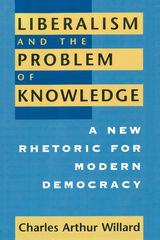 Liberalism and the Problem of Knowledge: A New Rhetoric for Modern Democracy
Charles Arthur Willard
University of Chicago Press, 1996 In this witty and provocative study of democracy and its critics, Charles Willard debunks liberalism, arguing that its exaggerated ideals of authenticity, unity, and community have deflected attention from the pervasive incompetence of "the rule of experts." He proposes a ground of communication that emphasizes common interests rather than narrow disputes.
The problem of "unity" and the public sphere has driven a wedge between libertarians and communitarians. To mediate this conflict, Willard advocates a shift from the discourse of liberalism to that of epistemics. As a means of organizing the ebb and flow of consensus, epistemics regards democracy as a family of knowledge problems—as ways of managing discourse across differences and protecting multiple views.
Building a bridge between warring peoples and warring paradigms, this book also reminds those who presume to instruct government that they are obliged to enlighten it, and that to do so requires an enlightened public discourse.
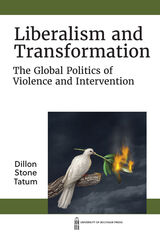 Liberalism and Transformation: The Global Politics of Violence and Intervention
Dillon Stone Tatum
University of Michigan Press, 2021 Liberalism and Transformation is the first scholarly work that explores the historical, philosophical, and intellectual development of global liberalism since the nineteenth century in the context of the deployment of violence, force, and intervention. Using an approach that includes interpretive and contextual analysis of texts from writers, philosophers, and policy-makers across nearly two centuries, as well as historiographical and historical analysis of archival documents (some of which have been recently declassified) and other media, Liberalism and Transformation narrates the messy history of emancipatory liberalism and its engagement with issues of war and peace. The book contributes to both a rethinking of liberal democracy and its relationship to world politics, as well as the effects of liberal internationalism on global processes. Furthermore, Liberalism and Transformation invites readers to reflect on global ethics and transformation in world politics. In the first place, it shows how ethical imaginings of the world have direct effects on actions of transformative importance. In the second place, it suggests that discourses are fluid, changing, and complex.
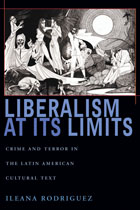 Liberalism at Its Limits: Crime and Terror in the Latin American Cultural Text
Ileana Rodriguez
University of Pittsburgh Press, 2009 In Liberalism at Its Limits, Ileana Rodríguez considers several Latin American nations that govern under the name of liberalism yet display a shocking range of nondemocratic features. In her political, cultural, and philosophical analysis, she examines these environments in which liberalism seems to have reached its limits, as the universalizing project gives way to rampant nonstate violence, gross inequality, and neocolonialism.
Focusing on Guatemala, Colombia, and Mexico, Rodríguez shows how standard liberal models fail to account for new forms of violence and exploitation, which in fact follow from specific clashes between liberal ideology and local practice. Looking at these tensions within the ostensibly well-ordered state, Rodríguez exposes how the misunderstanding and misuse of liberal principles are behind realities of political turmoil, and questions whether liberalism is in fact an ideology sufficient to empower populations and transition nation-states into democratic roles in the global order.
In this way, Liberalism at Its Limits offers a critical examination of the forced fitting of liberal models to Latin American nations and reasserts cross-cultural communication as crucial to grasping the true link between varying systems of value and politics.
Liberalism Disavowed: Communitarianism and State Capitalism in Singapore
Beng Huat Chua
National University of Singapore Press, 2018 In Liberalism Disavowed, Chua Beng Huat examines the rejection of Western-style liberalism in Singapore and the way the People's Action Party has forged an independent non-Western ideology. This book explains the evolution of this communitarian ideology,
Liberalism in Modern Times
Ernest Gellner
Central European University Press, 1996 This fascinating study pays tribute to the life and work of the Brazilian essayist, thinker and diplomat José G. Merquior, who died prematurely in 1991. Part I concentrates on Merquiorian thought itself and examines Merquior's own incisive review of the rebirth of the liberal idea. Part II ranges more widely: here, such distinguished contributors as John Hall, Ernest Gellner and Norberto Bobbio develop some of Merquior's favourite themes – liberalism as it relates to social cohesion, political stability, morality, republicanism and democracy, and the relativeness and scepticism that characterize postmodern thinking. The book's application to two regions of the world – to Merquior's own Latin America and to Central and Eastern Europe – is direct and obvious.
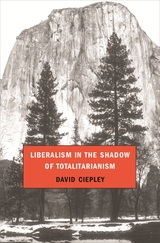 Liberalism in the Shadow of Totalitarianism
David Ciepley
Harvard University Press, 2007 This book argues that, more than any other factor, it was the encounter with totalitarianism that dissolved the ideals of American progressivism and crystallized the ideals of postwar liberalism. The New Deal began as a revolution in favor of progressive governance--executive-centered and expert-guided. But as David Ciepley shows, by the late 1930s, intellectuals and elites, reacting against the menace of totalitarianism, began to shrink from using state power to guide the economy or foster citizen virtues. All of the more statist governance projects of the New Deal were curtailed or abandoned, regardless of success, and the country placed on a more libertarian-corporatist trajectory, both economically and culturally. In economics, attempts to reorient industry from private profit to public use were halted, and free enterprise was reaffirmed. In politics, the ideal of governance by a strong, independent executive was rejected--along with notions of "central planning," "social control," and state imposition of "values"--and a politics of contending interest groups was embraced. In law, the encounter with totalitarianism brought an end to judicial deference, the embrace of civil rights and civil liberties, and the neutralist reinterpretation, and radicalization, of both. Finally, in culture, the encounter sowed the seeds of our own era--the era of the culture wars--in which traditional America has been mobilized against these liberal legal advances, and against the entire neutralist, "relativist," "secular humanist" reinterpretation of America that accompanies them.
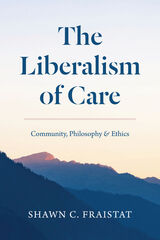 The Liberalism of Care: Community, Philosophy, and Ethics
Shawn C. Fraistat
University of Chicago Press, 2021 Attention to care in modern society has fallen out of view as an ethos of personal responsibility, free markets, and individualism has taken hold. The Liberalism of Care argues that contemporary liberalism is suffering from a crisis of care, manifest in a decaying sense of collective political responsibility for citizens’ well-being and for the most vulnerable members of our communities. Political scientist Shawn C. Fraistat argues that we have lost the political language of care, which, prior the nineteenth century, was commonly used to express these dimensions of political life.
To recover that language, Fraistat turns to three prominent philosophers—Plato, Jean-Jacques Rousseau, and William Godwin—who illuminate the varied ways caring language and caring values have structured core debates in the history of Western political thought about the proper role of government, as well as the rights and responsibilities of citizens. The Liberalism of Care presents a distinctive vision for our liberal politics where political communities and citizens can utilize the ethic and practices of care to face practical challenges.
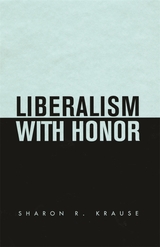 Liberalism with Honor
Sharon R. Krause
Harvard University Press, 2002 Why do men and women sometimes risk everything to defend their liberties? What motivates principled opposition to the abuse of power? In Liberalism with Honor, Sharon Krause explores honor as a motive for risky and difficult forms of political action. She shows the sense of honor to be an important source of such action and a spring of individual agency more generally.
Krause traces the genealogy of honor, including its ties to conscientious objection and civil disobedience, beginning in old-regime France and culminating in the American civil rights movement. She examines the dangers intrinsic to honor and the tensions between honor and modern democracy, but demonstrates that the sense of honor has supported political agency in the United States from the founders to democratic reformers such as Elizabeth Cady Stanton and Martin Luther King, Jr.
Honor continues to hold interest and importance today because it combines self-concern and personal ambition with principled higher purposes, and so challenges the disabling dichotomy between self-interest and self-sacrifice that currently pervades both political theory and American public life.
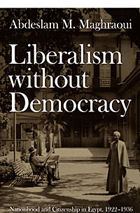 Liberalism without Democracy: Nationhood and Citizenship in Egypt, 1922–1936
Abdeslam M. Maghraoui
Duke University Press, 2006 The history of Western intervention in the Middle East stretches from the late eighteenth century to the present day. All too often, the Western rationale for invading and occupying a country to liberate its people has produced new forms of domination that have hindered rather than encouraged the emergence of democratic politics. Abdeslam M. Maghraoui advances the understanding of this problematic dynamic through an analysis of efforts to achieve liberal reform in Egypt following its independence from Great Britain in 1922. In the 1920s and 1930s, Egypt’s reformers equated liberal notions of nationhood and citizenship with European civilization and culture. As Maghraoui demonstrates, in their efforts to achieve liberalization, they sought to align Egypt with the West and to dissociate it from the Arab and Islamic worlds. Egypt’s professionals and leading cultural figures attempted to replace the fez with European-style hats; they discouraged literary critics from studying Arabic poetry, claiming it was alien to Egyptian culture. Why did they feel compelled to degrade local cultures in order to accommodate liberal principles? Drawing on the thought of Lacan, Fanon, Said, and Bhabha, as well as contemporary political theory, Maghraoui points to liberalism’s inherent contradiction: its simultaneous commitments to individual liberty and colonial conquest. He argues that when Egypt’s reformers embraced the language of liberalism as their own, they adopted social prejudices built into that language. Efforts to achieve liberalization played out—and failed—within the realm of culture, not just within the political arena. Opinions voiced through literary works, cartoons, newspaper articles on controversial social issues, and other forms of cultural expression were ultimately more important to the fate of liberalism in Egypt than were questions of formal political participation and representation. Liberalism without Democracy demonstrates the powerful—and under appreciated—role of language and culture in defining citizenship and political community.
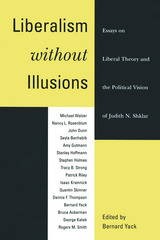 Liberalism without Illusions: Essays on Liberal Theory and the Political Vision of Judith N. Shklar
Edited by Bernard Yack
University of Chicago Press, 1996 Well before her untimely death in 1992, Judith Shklar was widely recognized as one of the outstanding political theorists of our time. A pivotal figure in the reinvigoration of liberal theory during the past two decades, Shklar brought to life a complex world in which every vice has distinct political consequences and every virtue unavoidable costs. Her unique and unusually realistic approach to the study of liberal practices and institutions added psychological depth as well as a bracing pragmatism to the liberal political imagination.
In this tightly organized collection of essays, sixteen distinguished political theorists explore Shklar's intellectual legacy, focussing on both her own ideas and the broad range of issues that most intrigued her. The volume opens with a series of varied and illuminating assessments of Shklar's conception of liberal politics. The second section, with essays on Descartes and Racine, Hobbes, Rousseau, and Laski, emphasizes the relation between individual freedom and moral psychology in modern political thought. The third section addresses contemporary issues, such as the role of hypocrisy, offensive speech, and constitutional courts in liberal democracies. The book concludes with an autobiographical essay by Shklar that provides a vivid sense of her singular voice and personality.
The contributors to this volume are Bruce Ackerman, Seyla Benhabib, John Dunn, Amy Gutmann, Stanley Hoffmann, Stephen Holmes, George Kateb, Isaac Kramnick, Patrick Riley, Nancy Rosenblum, Quentin Skinner, Rogers M. Smith, Tracy B. Strong, Dennis F. Thompson, Michael Walzer, and Bernard Yack.
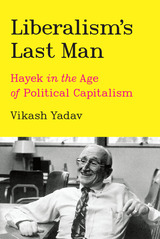 Liberalism's Last Man: Hayek in the Age of Political Capitalism
Vikash Yadav
University of Chicago Press, 2023 A modern reframing of Friedrich Hayek’s most famous work for the 21st century. Friedrich Hayek’s The Road to Serfdom was both an intellectual milestone and a source of political division, spurring fiery debates around capitalism and its discontents. In the ensuing discord, Hayek’s true message was lost: liberalism is a thing to be protected above all else, and its alternatives are perilous. In Liberalism’s Last Man, Vikash Yadav revives the core of Hayek’s famed work to map today’s primary political anxiety: the tenuous state of liberal meritocratic capitalism—particularly in North America, Europe, and Asia—in the face of strengthening political-capitalist powers like China, Vietnam, and Singapore. As open societies struggle to match the economic productivity of authoritarian-capitalist economies, the promises of a meritocracy fade; Yadav channels Hayek to articulate how liberalism’s moral backbone is its greatest defense against repressive social structures.
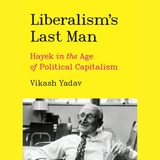 Liberalism's Last Man: Hayek in the Age of Political Capitalism
Vikash Yadav
University of Chicago Press, 2023 A modern reframing of Friedrich Hayek’s most famous work for the 21st century. Friedrich Hayek’s The Road to Serfdom was both an intellectual milestone and a source of political division, spurring fiery debates around capitalism and its discontents. In the ensuing discord, Hayek’s true message was lost: liberalism is a thing to be protected above all else, and its alternatives are perilous. In Liberalism’s Last Man, Vikash Yadav revives the core of Hayek’s famed work to map today’s primary political anxiety: the tenuous state of liberal meritocratic capitalism—particularly in North America, Europe, and Asia—in the face of strengthening political-capitalist powers like China, Vietnam, and Singapore. As open societies struggle to match the economic productivity of authoritarian-capitalist economies, the promises of a meritocracy fade; Yadav channels Hayek to articulate how liberalism’s moral backbone is its greatest defense against repressive social structures.
 Liberalism’s Religion
Cécile Laborde
Harvard University Press, 2017 Liberal societies conventionally treat religion as unique under the law, requiring both special protection (as in guarantees of free worship) and special containment (to keep religion and the state separate). But recently this idea that religion requires a legal exception has come under fire from those who argue that religion is no different from any other conception of the good, and the state should treat all such conceptions according to principles of neutrality and equal liberty. Cécile Laborde agrees with much of this liberal egalitarian critique, but she argues that a simple analogy between the good and religion misrepresents the complex relationships among religion, law, and the state. Religion serves as more than a statement of belief about what is true, or a code of moral and ethical conduct. It also refers to comprehensive ways of life, political theories of justice, modes of voluntary association, and vulnerable collective identities.
Disaggregating religion into its various dimensions, as Laborde does, has two clear advantages. First, it shows greater respect for ethical and social pluralism by ensuring that whatever treatment religion receives from the law, it receives because of features that it shares with nonreligious beliefs, conceptions, and identities. Second, it dispenses with the Western, Christian-inflected conception of religion that liberal political theory relies on, especially in dealing with the issue of separation between religion and state. As a result, Liberalism’s Religion offers a novel answer to the question: Can Western theories of secularism and religion be applied more universally in non-Western societies?
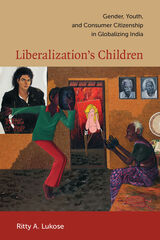 Liberalization's Children: Gender, Youth, and Consumer Citizenship in Globalizing India
Ritty A. Lukose
Duke University Press, 2009 Liberalization’s Children explores how youth and gender have become crucial sites for a contested cultural politics of globalization in India. Popular discourses draw a contrast between “midnight’s children,” who were rooted in post-independence Nehruvian developmentalism, and “liberalization’s children,” who are global in outlook and unapologetically consumerist. Moral panics about beauty pageants and the celebration of St. Valentine’s Day reflect ambivalence about the impact of an expanding commodity culture, especially on young women. By simply highlighting the triumph of consumerism, such discourses obscure more than they reveal. Through a careful analysis of “consumer citizenship,” Ritty A. Lukose argues that the breakdown of the Nehruvian vision connects with ongoing struggles over the meanings of public life and the cultural politics of belonging. Those struggles play out in the ascendancy of Hindu nationalism; reconfigurations of youthful, middle-class femininity; attempts by the middle class to alter understandings of citizenship; and assertions of new forms of masculinity by members of lower castes. Moving beyond elite figurations of globalizing Indian youth, Lukose draws on ethnographic research to examine how non-elite college students in the southern state of Kerala mediate region, nation, and globe. Kerala sits at the crossroads of development and globalization. Held up as a model of left-inspired development, it has also been transformed through an extensive and largely non-elite transnational circulation of labor, money, and commodities to the Persian Gulf and elsewhere. Focusing on fashion, romance, student politics, and education, Lukose carefully tracks how gender, caste, and class, as well as colonial and postcolonial legacies of culture and power, affect how students navigate their roles as citizens and consumers. She explores how mass-mediation and an expanding commodity culture have differentially incorporated young people into the structures and aspirational logics of globalization.
 Liberals, Conservatives, and Mavericks: On Christian Churches of Eastern Europe since 1980. A Festschrift for Sabrina P. Ramet
Frank Cibulka
Central European University Press, 2025 No Church is monolithic—this is the preliminary premise of this volume on the public place of religion in a representative number of post-communist countries. The studies confirm that within any religious organization we can expect to find fissures, factions, theological or ideological quarrels, and perhaps even competing interest groups, such as missionary workers, regular clergy versus secular clergy, and sometimes even competing ecclesiastical hierarchies. The main focus of the book rests on the divisions arising within select Christian Churches, as they confront the processes of secularization and atheization. The coverage area includes Russia and the Ukraine, East-Central Europe and South-Eastern Europe. Some chapters focus on individual clergy who challenge the mainstream of their given Church either from a more liberal or from a more conservative perspective, while others deal with the divisive forces impacting the religious organizations. This festschrift to honor Sabrina Ramet’s seminal contribution to the study of religion in the politics of the communist and post-communist world, brings together several generations of scholars from a variety of countries, both those well established in their fields of study as well as young promising academics.
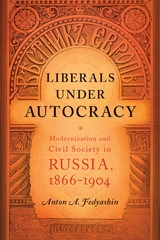 Liberals under Autocracy: Modernization and Civil Society in Russia, 1866–1904
Anton A. Fedyashin
University of Wisconsin Press, 2012 With its rocky transition to democracy, post-Soviet Russia has made observers wonder whether a moderating liberalism could ever succeed in such a land of extremes. But in Liberals under Autocracy, Anton A. Fedyashin looks back at the vibrant Russian liberalism that flourished in the country’s late imperial era, chronicling its contributions to the evolution of Russia’s rich literary culture, socioeconomic thinking, and civil society.
For five decades prior to the revolutions of 1917, The Herald of Europe (Vestnik Evropy) was the flagship journal of Russian liberalism, garnering a large readership. The journal articulated a distinctively Russian liberal agenda, one that encouraged social and economic modernization and civic participation through local self-government units (zemstvos) that defended individual rights and interests—especially those of the peasantry—in the face of increasing industrialization. Through the efforts of four men who turned The Herald into a cultural nexus in the imperial capital of St. Petersburg, the publication catalyzed the growing influence of journal culture and its formative effects on Russian politics and society.
Challenging deep-seated assumptions about Russia’s intellectual history, Fedyashin’s work casts the country’s nascent liberalism as a distinctly Russian blend of self-governance, populism, and other national, cultural traditions. As such, the book stands as a contribution to the growing literature on imperial Russia's nonrevolutionary, intellectual movements that emphasized the role of local politics in both successful modernization and the evolution of civil society in an extraparliamentary environment.
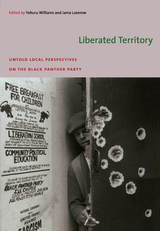 Liberated Territory: Untold Local Perspectives on the Black Panther Party
Yohuru Williams and Jama Lazerow, eds.
Duke University Press, 2008 With their collection In Search of the Black Panther Party, Yohuru Williams and Jama Lazerow provided a broad analysis of the Black Panther Party and its legacy. In Liberated Territory, they turn their attention to local manifestations of the organization, far away from the party’s Oakland headquarters. This collection’s contributors, all historians, examine how specific party chapters and offshoots emerged, developed, and waned, as well as how the local branches related to their communities and to the national party. The histories and character of the party branches vary as widely as their locations. The Cape Verdeans of New Bedford, Massachusetts, were initially viewed as a particular challenge for the local Panthers but later became the mainstay of the Boston-area party. In the early 1970s, the Winston-Salem, North Carolina, chapter excelled at implementing the national Black Panther Party’s strategic shift from revolutionary confrontation to mainstream electoral politics. In Detroit, the Panthers were defined by a complex relationship between their above-ground activities and an underground wing dedicated to armed struggle. While the Milwaukee chapter was born out of a rising tide of black militancy, it ultimately proved more committed to promoting literacy and health care and redressing hunger than to violence. The Alabama Black Liberation Front did not have the official imprimatur of the national party, but it drew heavily on the Panthers’ ideas and organizing strategies, and its activism demonstrates the broad resonance of many of the concerns articulated by the national party: the need for jobs, for decent food and housing, for black self-determination, and for sustained opposition to police brutality against black people. Liberated Territory reveals how the Black Panther Party’s ideologies, goals, and strategies were taken up and adapted throughout the United States. Contributors: Devin Fergus, Jama Lazerow, Ahmad A. Rahman, Robert W. Widell Jr., Yohuru Williams
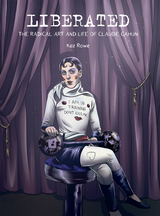 Liberated: The Radical Art and Life of Claude Cahun
Kaz Rowe
J. Paul Getty Trust, The, 2023 Courageous Surrealist artist Claude Cahun championed freedom at every turn, from rejecting gender norms and finding queer love to risking death to sabotage the Nazis.
At the turn of the twentieth century in Nantes, France, Lucy Schwob met Suzanne Malherbe, and lightning struck. The two became partners both artistically and romantically and transformed themselves into the creative personas Claude Cahun and Marcel Moore. Together, the couple embarked on a radical journey of Surrealist collaboration that would take them from conservative provincial France to the vibrancy of 1920s Paris to the oppression of Nazi-occupied Jersey during World War II, where they used art to undermine the Nazi regime.
Cahun and Moore challenged gender roles and championed freedom at a time when strict societal norms meant that the truth of their relationship had to remain secret. Featuring ten photographs by Cahun and Moore, this graphic biography by cartoonist Kaz Rowe brings Cahun’s inspiring story to life.
Ages thirteen to eighteen
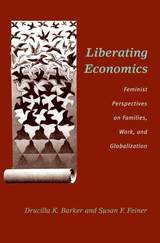 Liberating Economics: Feminist Perspectives on Families, Work, and Globalization
Drucilla K. Barker and Susan F. Feiner
University of Michigan Press, 2004 Liberating Economics draws on central concepts from women's studies scholarship to construct a feminist understanding of the economic roles of families, caring labor, motherhood, paid and unpaid labor, poverty, the feminization of labor, and the consequences of globalization. Barker and Feiner consistently recognize the importance of social location -- gender, race, class, sexual identity, and nationality -- in economic processes shaping the home, paid employment, market relations, and the global economy. Throughout they connect women's economic status in the industrialized nations to the economic circumstances surrounding women in the global South.
Rooted in the two disciplines, this book draws on the rich tradition of interdisciplinary work in feminist social science scholarship to construct a parallel between the notions that the "personal is political" and "the personal is economic." Drucilla K. Barker is Professor of Economics and Women's Studies, Hollins University. Susan F. Feiner is Associate Professor of Economics and Women's Studies, University of Southern Maine.
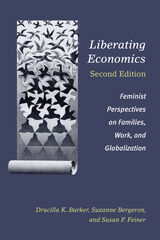 Liberating Economics, Second Edition: Feminist Perspectives on Families, Work, and Globalization
Drucilla K. Barker, Suzanne Bergeron, and Susan F. Feiner
University of Michigan Press, 2021 In this brand-new critical analysis of economics, Barker, Bergeron, and Feiner provide a feminist understanding of the economic processes that shape households, labor markets, globalization, and human well-being to reveal the crucial role that gender plays in the economy today.
With all new and updated chapters, the second edition of Liberating Economics examines recent trends in inequality, global indebtedness, crises of care, labor precarity, and climate change. Taking an interdisciplinary and intersectional feminist approach, the new edition places even more emphasis on the ways that gender, race, class, sexuality, and nationality shape the economy. It also highlights the centrality of social reproduction in economic systems and makes connections between the economic circumstances of women in global North and global South. Throughout, the authors reject the idea that there is no alternative to our current neoliberal market economy and offer alternative ways of thinking about and organizing economic systems in order to achieve gender-equitable outcomes.
Written in an accessible and engaging style, this book will be of interest to students and scholars across a range of fields, policymakers, and any reader interested in creating just futures.
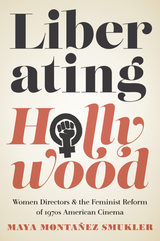 Liberating Hollywood: Women Directors and the Feminist Reform of 1970s American Cinema
Smukler, Maya M
Rutgers University Press, 2019 Winner of the 2018 Richard Wall Memorial Award from the Theater Library Association
Liberating Hollywood examines the professional experiences and creative output of women filmmakers during a unique moment in history when the social justice movements that defined the 1960s and 1970s challenged the enduring culture of sexism and racism in the U.S. film industry. Throughout the 1970s feminist reform efforts resulted in a noticeable rise in the number of women directors, yet at the same time the institutionalized sexism of Hollywood continued to create obstacles to closing the gender gap. Maya Montañez Smukler reveals that during this era there were an estimated sixteen women making independent and studio films: Penny Allen, Karen Arthur, Anne Bancroft, Joan Darling, Lee Grant, Barbara Loden, Elaine May, Barbara Peeters, Joan Rivers, Stephanie Rothman, Beverly Sebastian, Joan Micklin Silver, Joan Tewkesbury, Jane Wagner, Nancy Walker, and Claudia Weill. Drawing on interviews conducted by the author, Liberating Hollywood is the first study of women directors within the intersection of second wave feminism, civil rights legislation, and Hollywood to investigate the remarkable careers of these filmmakers during one of the most mythologized periods in American film history.
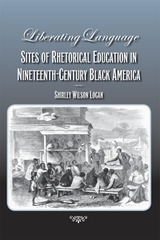 Liberating Language: Sites of Rhetorical Education in Nineteenth-Century Black America
Shirley Wilson Logan
Southern Illinois University Press, 2008 Liberating Language identifies experiences of nineteenth-century African Americans—categorized as sites of rhetorical education—that provided opportunities to develop effective communication and critical text-interpretation skills. Author Shirley Wilson Logan considers how nontraditional sites, which seldom involved formal training in rhetorical instruction, proved to be effective resources for African American advancement. Logan traces the ways that African Americans learned lessons in rhetoric through language-based activities associated with black survival in nineteenth-century America, such as working in political organizations, reading and publishing newspapers, maintaining diaries, and participating in literary societies. According to Logan, rhetorical training was manifested through places of worship and military camps, self-education in oratory and elocution, literary societies, and the black press. She draws on the experiences of various black rhetors of the era, such as Frederick Douglass, Frances Harper, Fanny Coppin, Charles Chesnutt, Ida B. Wells, and the lesser-known Oberlin-educated Mary Virginia Montgomery, Virginia slave preacher "Uncle Jack," and former slave "Mrs. Lee." Liberating Language addresses free-floating literacy, a term coined by scholar and writer Ralph Ellison, which captures the many settings where literacy and rhetorical skills were acquired and developed, including slave missions, religious gatherings, war camps, and even cigar factories. In Civil War camp- sites, for instance, black soldiers learned to read and write, corresponded with the editors of black newspapers, edited their own camp-based papers, and formed literary associations. Liberating Language outlines nontraditional means of acquiring rhetorical skills and demonstrates how African Americans, faced with the lingering consequences of enslavement and continuing oppression, acquired rhetorical competence during the late eighteenth century and throughout the nineteenth century.
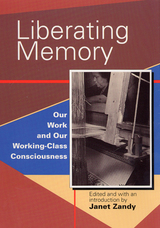 Liberating Memory: Our Work and Our Working-Class Consciousness
Zandy, Janet
Rutgers University Press, 1994 This is a book about working-class identity, consciousness, and self-determination. It offers an alternative to middle-class assimiliation and working-class amnesia. The twenty-five contributors use memory--both personal and collective--to show the relationship between the uncertain economic rhythms of working-class life and the possibilities for cultural and political agency. Manual labor and intellectual work are connected in these multicultural autobiographies of writers, educators, artists, political activists, musicians, and photographers and in the cultural work--the poems, stories, photographs, lectures, music--they produce. Illustrated with family snapshots, this collection--the first of its kind--includes the work of a female machinist who is also a poet, a secretary who is also a writer, a poet who worked on the assembly line, a musician who was also a red-diaper baby, and an academic who is recovering the working-class writing of her father. The consciousness that is revealed in this book makes evident the value of class identity to collective, democratic struggle. The contributors are Maggie Anderson, Steve Cagan, Jim Daniels, Lennard Davis, Masani Alexis de Veaux, Sue Doro, Julie Olsen Edwards, Carol Faulkner, Barbara Fox, Laura Hapke, Florence Howe, David Joseph, Linda McCarriston, Wilma Elizabeth McDaniel, Gregory Mantsios, M. Bella Mirabella, Joseph Nassar, Tillie Olsen, Maxine Scates, Saul Slapikoff, Clarissa T. Sligh, Carol Tarlen, Joann Maria Vasoncellos, Pat Wynne, and Janet Zandy.
 Liberating Method: Feminism and Social Research
Marjorie Devault
Temple University Press, 1999 Feminist scholars, and those inspired by other liberatory movements, have raised profound questions about the standard practices of social research. Arguing that established methods too often ignore and obfuscate social oppression, they search for approaches that will more adequately represent marginalized groups and the social processes that organize their lives. Liberating Method charts one researcher's view of this project as Marjorie L. DeVault, one of the leading practitioners and teachers of feminist methodology, examines in her collection of new and previously published essays the dimensions of feminist research.
DeVault believes in "writing carefully," that is with care (precision) and caring (empathy). In addition to essays on how women write, are silenced, and can speak up, she includes an autobiographical sketch, a discussion of "the self as resource," and a section on what she calls "excavation," or the work of recovering unrecognized or suppressed aspects of women's experience. She explores the sources and meanings of feminist methodology, the strategies of reflexive analysis, and the issues that arise when writing and teaching feminist research. Committed to a feminism attentive to oppressions that operate simultaneously with gender, DeVault considers exclusions and distortions in feminist research and strategies for building more inclusive approaches. Including a closing essay that presents "practical advice" for oppositional researchers, LiberatingMethod reflects DeVault's conviction that feminist insights can and should contribute to a sounder, more rigorous social science.
Liberating Our Imaginations: The Bible and Minoritized Literature
David Janzen
SBL Press, 2025 If we want to read the Bible as a resource for liberative fights against systemic oppression, how can we learn to interpret it differently? Liberating Our Imaginations presents an answer. David Janzen demonstrates the possibilities for liberation produced by reading biblical texts alongside works of contemporary literature by minoritized authors. While contemporary examples of oppression are not identical, the process of reading ancient and contemporary texts together can nonetheless open up imaginative and liberative interpretations of biblical texts. This approach allows people from any community to use the Bible as a resource in different struggles against oppression.
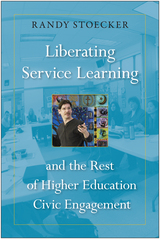 Liberating Service Learning and the Rest of Higher Education Civic Engagement
Randy Stoecker
Temple University Press, 2016 Randy Stoecker has been “practicing” forms of community-engaged scholarship, including service learning, for thirty years now, and he readily admits, “Practice does not make perfect.” In his highly personal critique, Liberating Service Learning and the Rest of Higher Education Civic Engagement, the author worries about the contradictions, unrealized potential, and unrecognized urgency of the causes as well as the risks and rewards of this work. Here, Stoecker questions the prioritization and theoretical/philosophical underpinnings of the core concepts of service learning: 1. learning, 2. service, 3. community, and 4. change. By “liberating” service learning, he suggests reversing the prioritization of the concepts, starting with change, then community, then service, and then learning. In doing so, he clarifies the benefits and purpose of this work, arguing that it will create greater pedagogical and community impact. Liberating Service Learning and the Rest of Higher Education Civic Engagement challenges—and hopefully will change—our thinking about higher education community engagement.
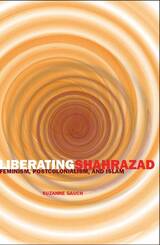 Liberating Shahrazad: Feminism, Postcolonialism, and Islam
Suzanne Gauch
University of Minnesota Press, 2006 Shahrazad, the legendary fictional storyteller who spun the tales of the 1,001 Arabian Nights, has long been rendered as a silent exotic beauty by Western film and fiction adaptations. Now, she talks back to present a new image of Muslim women.
In Liberating Shahrazad, Suzanne Gauch analyzes how postcolonial writers and filmmakers from Algeria, Morocco, and Tunisia have reclaimed the storyteller in order to portray Muslim women in ways that highlight their power to shape their own destinies. Gauch looks at Maghrebian works that incorporate Shahrazad’s storytelling techniques into unexpected and unforeseen narratives. Highlighting the fluid nature of storytelling, Gauch demonstrates how these new depictions of Shahrazad—from artists such as Moufida Tlatli, Fatima Mernissi, Tahar Ben Jelloun, Assia Djebar, Leïla Sebbar—navigate the demands of a global marketplace, even as they reshape the stories told about the Islamic world.
In the face of both rising fundamentalism and proliferating Western media representations of Arab and Muslim women as silent, exploited, and uneducated victims, Gauch establishes how contemporary works of literature and film revive the voice of a long-silenced Shahrazad—and, ultimately, overthrow oppressive images of Muslim women. Suzanne Gauch is assistant professor of English and women’s studies at Temple University.
 Liberating Voices: Oral Tradition in African American Literature
Gayl Jones
Harvard University Press, 1991 The powerful novelist here turns penetrating critic, giving us—in lively style—both trenchant literary analysis and fresh insight on the art of writing.
“When African American writers began to trust the literary possibilities of their own verbal and musical creations,” writes Gayl Jones, they began to transform the European and European American models, and to gain greater artistic sovereignty.” The vitality of African American literature derives from its incorporation of traditional oral forms: folktales, riddles, idiom, jazz rhythms, spirituals, and blues. Jones traces the development of this literature as African American writers, celebrating their oral heritage, developed distinctive literary forms.
The twentieth century saw a new confidence and deliberateness in African American work: the move from surface use of dialect to articulation of a genuine black voice; the move from blacks portrayed for a white audience to characterization relieved of the need to justify. Innovative writing—such as Charles Waddell Chesnutt’s depiction of black folk culture, Langston Hughes’s poetic use of blues, and Amiri Baraka’s recreation of the short story as a jazz piece—redefined Western literary tradition.
For Jones, literary technique is never far removed from its social and political implications. She documents how literary form is inherently and intensely national, and shows how the European monopoly on acceptable forms for literary art stifled American writers both black and white. Jones is especially eloquent in describing the dilemma of the African American writers: to write from their roots yet retain a universal voice; to merge the power and fluidity of oral tradition with the structure needed for written presentation. With this work Gayl Jones has added a new dimension to African American literary history.
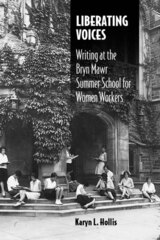 Liberating Voices: Writing at the Bryn Mawr Summer School for Women Workers
Karyn L. Hollis
Southern Illinois University Press, 2004 During the 1920s and 1930s at the Bryn Mawr Summer School for Women Workers, working-class women were educated in the liberal arts and instructed in writing to assume more powerful roles in the industrial workplace. In Liberating Voices: Writing at the Bryn Mawr Summer School for Women Workers, Karyn L. Hollis tells the remarkable story of how this multiclass, multiethnic American institution rooted in composition pedagogy, literary history, and leftist thought emerged from the broad social, economic, and ideological trends of the era. The summer school curriculum, Hollis shows, enhanced the individual and collective self-confidence of the 1,800 women who studied there between 1921 and 1938. Drawing heavily on the women’s writings—including autobiography, poetry, labor drama, humor, and economic reporting—Liberating Voices adds significantly to the small oeuvre of published writing by working-class women, who were, in this case, mostly nontraditional students, immigrants, and minorities. Outlining a materialist pedagogy that centers on the women’s daily economic struggles as well as their family and community experiences, Hollis reveals the tensions that stemmed from differences in race, ethnicity, class, and religion. She also shows how the students exploited cultural scripts and drew strength from their diversity, eventually insisting on a democratic sharing of power with faculty and administrators at the Summer School. Hollis provides a thorough ethnography of the Summer School with respect to its place in the social and political history of the 1920s and 1930s, and then situates the school’s pedagogy within the history of American education and composition instruction. Concepts from literary criticism and composition theory provide the framework for an analysis of the working women’s autobiographical writing, revealing how the narrative voice of their prose grew from weak and individualized to empowered and collective as the women described their families, childhood, work, unions, and education over time. The volume is complemented by sixteen illustrations. Additional analysis of the women’s poetry points to their skill as both producers and consumers of literature. The common theme of body versus a powerful machine in the workplace bears witness to the industrial exploitation the women endured. Taking up postmodern questions of agency and voice, Hollis argues that the women used a variety of cultural texts to construct discourses that reflected their needs and desires. Liberating Voices not only provides a previously untold chapter in the history of American worker education, it also showcases a liberating pedagogy that has salient implications for contemporary classrooms.
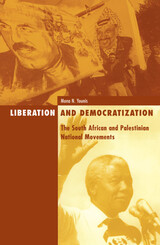 Liberation and Democratization: The South African and Palestinian National Movements
Mona N. Younis
University of Minnesota Press, 2000 The first comprehensive comparison of two of the century’s most important liberation movements. Arising in the 1910s and emerging as legitimate governing bodies in the 1990s, the South African and the Palestinian national liberation movements have exhibited remarkable parallels over the course of their development. The fortunes of the African National Congress and the Palestinian Liberation Organization, however, have proven strikingly different. How the movements, despite similar circumstances and experiences, have arrived at such dissimilar outcomes is described in Liberation and Democratization. Younis traces the evolution of the movements, from early domination by elites to the ascendancy of mass-based forces in their last phases of expansion. She shows how this latest shift, accompanied by a democratization of the process of liberation, made the movements more effective in the 1980s. Liberation and Democratization also identifies dissimilarities—the balance of class forces and resources—that led to the A.N.C.’s greater success relative to the P.L.O.’s achievements. The first comprehensive comparison of two of the most significant liberation movements of this century, Younis’s work brings to light problems and dynamics that will remain at work well into the future.
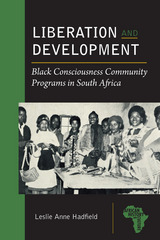 Liberation and Development: Black Consciousness Community Programs in South Africa
Leslie Anne Hadfield
Michigan State University Press, 2016 Liberation and Development: Black Consciousness Community Programs in South Africa is an account of the community development programs of the Black Consciousness movement in South Africa. It covers the emergence of the movement’s ideas and practices in the context of the late 1960s and early 1970s, then analyzes how activists refined their practices, mobilized resources, and influenced people through their work. The book examines this history primarily through the Black Community Programs organization and its three major projects: the yearbook Black Review, the Zanempilo Community Health Center, and the Njwaxa leatherwork factory. As opposed to better-known studies of antipolitical, macroeconomic initiatives, this book shows that people from the so-called global South led development in innovative ways that promised to increase social and political participation. It particularly explores the power that youth, women, and churches had in leading change in a hostile political environment. With this new perspective on a major liberation movement, Hadfield not only causes us to rethink aspects of African history but also offers lessons from the past for African societies still dealing with developmental challenges similar to those faced during apartheid.
Liberation and Education: Perspectives on Black Educational Thought
Ronald E. Chennault
Rutgers University Press, 2026 Liberation and Education brings together a collection of essays about Black educators’ and organizations’ quests to cultivate and employ educational strategies for the liberation of Black people. The contributions examine the enduring nature of Black people’s thinking about education prior to and through enslavement to the present. It documents a variety of critical accounts of how Black people have developed ways to free themselves mentally from the legacies of slavery, the view of Black inferiority, and white supremacy.
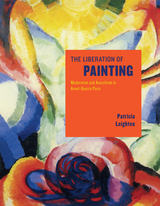 The Liberation of Painting: Modernism and Anarchism in Avant-Guerre Paris
Patricia Leighten
University of Chicago Press, 2013 The years before World War I were a time of social and political ferment in Europe, which profoundly affected the art world. A major center of this creative tumult was Paris, where many avant-garde artists sought to transform modern art through their engagement with radical politics. In this provocative study of art and anarchism in prewar France, Patricia Leighten argues that anarchist aesthetics and a related politics of form played crucial roles in the development of modern art, only to be suppressed by war fever and then forgotten. Leighten examines the circle of artists—Pablo Picasso, Juan Gris, František Kupka, Maurice de Vlaminck, Kees Van Dongen, and others—for whom anarchist politics drove the idea of avant-garde art, exploring how their aesthetic choices negotiated the myriad artistic languages operating in the decade before World War I. Whether they worked on large-scale salon paintings, political cartoons, or avant-garde abstractions, these artists, she shows, were preoccupied with social criticism. Each sought an appropriate subject, medium, style, and audience based on different conceptions of how art influences society—and their choices constantly shifted as they responded to the dilemmas posed by contradictory anarchist ideas. According to anarchist theorists, art should expose the follies and iniquities of the present to the masses, but it should also be the untrammeled expression of the emancipated individual and open a path to a new social order. Revealing how these ideas generated some of modernism’s most telling contradictions among the prewar Parisian avant-garde, The Liberation of Painting restores revolutionary activism to the broader history of modern art.
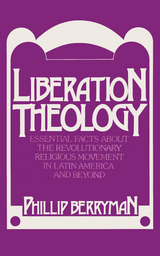 Liberation Theology
Phillip Berryman
Temple University Press, 1987 "[A]n introduction that competently places liberation theology in its cultural and religious context, [and] elucidates its roots in the Bible and in Catholic theology."
--The Washington Post Book World
In the chaos that is Latin American politics, what role does the Catholic church play with regard to its clergy and its members? How does the church function in Latin America on an everyday, practical level? And how successful has the church been intervening in political matters despite the fact that Latin American countries are essentially Catholic nations? Philip Berryman addresses these timely and challenging issues in this comprehensive.
Unlike journalistic accounts, which all too frequently portray liberation theology as an exotic brew of Marxism and Christianity or as a movement of rebel priests bent on challenging church authority, this book aims to get beyond these clichés, to explain exactly what liberation theology is, how it arose, how it works in practice, and its implications. The book also examines how liberation theology functions at the village or barrio level, the political impact of liberation theology, and the major objections to it posed by critics, concluding with a tentative assessment of the future of liberation theology.
"Liberation Theology is just the book I've been searching for--unsuccessfully until now--as the basic text for the course I offer on Latin American Liberation Theology. It is everything I need. Concise, well-written, and balanced, it gives some real attention to the critics of Liberation Theology, as any fair text must do."
--Harvey Cox, Harvard Divinity School
"...a very clear, reliable, and readable introduction to and survey of liberation theology. It is also an introduction to the literature on the subject interwoven with history...[and] Berryman is a very trustworthy interpreter."
--Dr. Larry Rasmussen, Union Theological Seminary
"The book answers the charge that Liberation Theology is essentially Marxist by indicating to the reader that the use of Marxism is something minor in comparison to a Biblical reading and interpretation in the light of contemporary social and political realities.... It advocates the use of theologies of liberation and is addressed to an American audience."
--Monsignor Joseph W. Devlin, Department of Religion, LaSalle University
"... adds significantly to the documenting and appraisal of a theological movement of lasting importance."
--John Raines, Department of Religion, Temple University
 Liberation Theology and Praxis in Contemporary Latin America: As It Was in the Beginning?
Edited by Pablo Bradbury and Niall H.D. Geraghty
University of London Press, 2025 A study of liberationist Christianity in Latin America, offering new insights for discussing liberation theology.
This highly interdisciplinary collection brings together diverse and complementary approaches from history, theology, cultural studies, architecture, sociology, and anthropology to reevaluate the legacy of liberation theology in Latin America.
Liberation theology was born in the 1960s at a time of Church renewal and socio-economic ferment, as many sought more radical solutions in the context of the exhaustion of developmentalist projects and the institutionalized violence of capitalism. The book’s central focus on the lived experiences and embodied practices of those engaged in social action in the region challenges the narrative that suggests that liberation theology had reached its decline by the end of the 1970s. It demonstrates that liberationist Christianity was at once more diverse and internally conflicted, more widely resonant outside ecclesial confines, and more interconnected over time than often allowed.
The chapters investigate a range of topics: the ecclesiology of a revolutionary movement of Argentine priests in the 1960s and ́1970s, the engagement of liberation theology with Participatory Action Research and its influence on architectural approaches and urbanism, 1980s feminist liberation theology, encounters with Western human rights at a time of Cold War repression and exile, and ecofeminist political theology in contemporary Latin America. Pulling these threads together, Liberation Theology and Praxis in Contemporary Latin America invites us to reconsider how we understand liberation theology’s history as well as its reach into the present day.
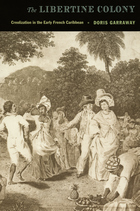 The Libertine Colony: Creolization in the Early French Caribbean
Doris Garraway
Duke University Press, 2005 Presenting incisive original readings of French writing about the Caribbean from the inception of colonization in the 1640s until the onset of the Haitian Revolution in the 1790s, Doris Garraway sheds new light on a significant chapter in French colonial history. At the same time, she makes a pathbreaking contribution to the study of the cultural contact, creolization, and social transformation that resulted in one of the most profitable yet brutal slave societies in history. Garraway’s readings highlight how French colonial writers characterized the Caribbean as a space of spiritual, social, and moral depravity. While tracing this critique in colonial accounts of Island Carib cultures, piracy, spirit beliefs, slavery, miscegenation, and incest, Garraway develops a theory of “the libertine colony.” She argues that desire and sexuality were fundamental to practices of domination, laws of exclusion, and constructions of race in the slave societies of the colonial French Caribbean. Among the texts Garraway analyzes are missionary histories by Jean-Baptiste Du Tertre, Raymond Breton, and Jean-Baptiste Labat; narratives of adventure and transgression written by pirates and others outside the official civil and religious power structures; travel accounts; treatises on slavery and colonial administration in Saint-Domingue; the first colonial novel written in French; and the earliest linguistic description of the native Carib language. Garraway also analyzes legislation—including the Code noir—that codified slavery and other racialized power relations. The Libertine Colony is both a rich cultural history of creolization as revealed in Francophone colonial literature and an important contribution to theoretical arguments about how literary critics and historians should approach colonial discourse and cultural representations of slave societies.
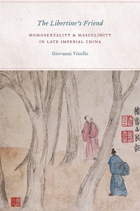 The Libertine's Friend: Homosexuality and Masculinity in Late Imperial China
Giovanni Vitiello
University of Chicago Press, 2011 Delving into three hundred years of Chinese literature, from the mid-sixteenth century to the mid-nineteenth, The Libertine’s Friend uncovers the complex and fascinating history of male homosexual and homosocial relations in the late imperial era. Drawing particularly on overlooked works of pornographic fiction, Giovanni Vitiello offers a frank exploration of the importance of same-sex love and eroticism to the evolution of masculinity in China.
Vitiello’s story unfolds chronologically, beginning with the earliest sources on homoeroticism in pre-imperial China and concluding with a look at developments in the twentieth century. Along the way, he identifies a number of recurring characters—for example, the libertine scholar, the chivalric hero, and the lustful monk—and sheds light on a set of key issues, including the social and legal boundaries that regulated sex between men, the rise of male prostitution, and the aesthetics of male beauty. Drawing on this trove of material, Vitiello presents a historical outline of changing notions of male homosexuality in China, revealing the integral part that same-sex desire has played in its culture.
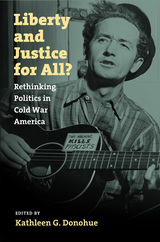 Liberty and Justice for All?: Rethinking Politics in Cold War America
Kathleen G. Donohue
University of Massachusetts Press, 2012 From the congressional debate over the "fall of China" to the drama of the Army–McCarthy hearings to the kitchen faceoff between Richard Nixon and Nikita Khrushchev, the political history of the early Cold War was long dominated by studies of presidential administrations, anticommunism, and foreign policy. In Liberty and Justice for All? a group of distinguished historians representing a variety of disciplinary perspectives—social history, cultural history, intellectual history, labor history, urban history, women's history, African American studies, and media studies—expand on the political history of the early Cold War by rethinking the relationship between politics and culture. How, for example, did folk music help to keep movement culture alive throughout the 1950s? How did the new medium of television change fundamental assumptions about politics and the electorate? How did American experiences with religion in the 1950s strengthen the separation of church and state? How did race, class, and gender influence the relationship between citizens and the state? These are just some of the questions addressed in this wide-ranging set of essays.
In addition to volume editor Kathleen G. Donohue, contributors include Howard Brick, Kari Frederickson, Andrea Friedman, David Greenberg, Grace Elizabeth Hale, Jennifer Klein, Laura McEnaney, Kevin M. Schultz, Jason Scott Smith, Landon R. Y. Storrs, and Jessica Weiss.
Liberty and Law
Brian Tierney
Catholic University of America Press, 2014 Liberty and Law examines a previously underappreciated theme in legal history - the idea of permissive natural law. The idea is mentioned only peripherally, if at all, in modern histories of natural law. Yet it engaged the attention of jurists, philosophers, and theologians over a long period and formed an integral part of their teachings. This ensured that natural law was not conceived of as merely a set of commands and prohibitions that restricted human conduct, but also as affirming a realm of human freedom, understood as both freedom from subjection and freedom of choice. Freedom can be used in many ways, and throughout the whole period from 1100 to 1800 the idea of permissive natural law was deployed for various purposes in response to different problems that arose. It was frequently invoked to explain the origin of private property and the beginnings of civil government.
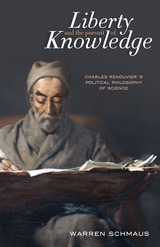 Liberty and the Pursuit of Knowledge: Charles Renouvier's Political Philosophy of Science
Warren Schmaus
University of Pittsburgh Press, 2018
French philosopher Charles Renouvier played an influential role in reviving philosophy in France after it was proscribed during the Second Empire. Drawn to the ideals of the French Revolution, Renouvier came to recognize that the free will and civil liberties he supported were essential to the pursuit of science, contrary to the ideologies of positivists and socialists who would restrict liberty in the name of science. He struggled against monarchy and religious authority in the period up through 1848 and defended a liberal, secular form of political organization at a critical turning point in French history, the beginning of the Third Republic. As Warren Schmaus argues, Renouvier’s work provides an example of one way in which philosophy of science can succeed in bringing about change in political life—by critiquing political ideologies that falsely claim absolute certainty on religious, scientific, or any other grounds. Liberty and the Pursuit of Knowledge explores the understudied relationship between Renouvier’s philosophy of science and his political philosophy, shedding new light on the significance of his thought for the history of philosophy.
Liberty and the Search for Identity
Ivan Zoltan Denes
Central European University Press, 2006 Liberalism was not only the first modern ideology, it was also the first secular movement to have an international presence. The scholarly articles in this collection, skillfully edited by Iván Zoltán Dénes, examine liberal ideas and movements from Scotland to the Ottoman Empire. The volume seeks to uncover and analyze various relationships between liberalisms and nationalisms, national identities and modernity concepts, nations and empires, nation-states and nationalities, traditions and modernities, images of the self and the others, modernization strategies and identity creations. This volume provides an important historical analysis that is essential toward understanding the questions and motivations of liberalism in the European Union today. This is, therefore, a timely contribution to both historiography and contemporary politics.
 Liberty, Equality, and Justice: Civil Rights, Women’s Rights, and the Regulation of Business, 1865–1932
Ross Evans Paulson
Duke University Press, 1997 Liberty, equality, and justice have long been treasured in American culture as core values. In Liberty, Equality, and Justice, Ross Evans Paulson studies social and intellectual changes in a critical period of American history—from the end of the Civil War to the early days of the Depression—and argues that attempts to achieve civil rights, women’s rights, and the regulation of business faltered because so many Americans ranked liberty for themselves higher than equality with others and justice for all.
Surveying a crucial period in the formation of the modern state and society, Paulson examines the prevailing conflicts of the time and the limitations of various attempts to institute reform, radical change, or ritualistic renewal of American society. His reading of existing scholarship highlights contested social constructs, clashing priorities, changing meanings of key terms, and shifting institutional dynamics in light of their contributions to a complex tragedy in which all parties fell short of the demands for democratic mutuality. Along with discussions of the movements and manipulations of presidential, congressional, and judicial politics, he integrates the experiences of diverse populations—including African Americans, women, Asian immigrants, Native Americans, and working people—and offers a new interpretation of the ways in which social change and political events interact to reframe the many possibilities of American society.
Liberty, Equality, Fraternity: And Three Brief Essays
James Fitzjames Stephen
University of Chicago Press, 1992 With great energy and clarity, Sir James Fitzjames Stephen (1829-1894), author of History of the Criminal Law of England, and judge of the High Court from 1879-91, challenges John Stuart Mill's On Liberty and On Utilitarianism, arguing that Mill's view of humanity is sentimental and utopian.
"His writing is strong meat—full of the threat of hellfrire, the virtue of government by the lash and a fervent belief that the state cannot remain neutral but has a duty to espouse a moral code."—Roderick Munday, Cambridge Law Journal
Liberty Lanes
Robin Troy
University of Nevada Press, 2011 Liberty Lanes is a bowling alley in a small Montana town where a senior bowling league meets three times a week. Nelson Moore, one of the bowlers, has recently become a local hero by saving a teammate from choking on a happy hour chicken bone. Now he must deal with his newfound fame while coping with the early stages of dementia. This is an engaging and often moving novel about a group of senior citizens bound together by old friendships and romances, and by their determination to live life to its fullest. Senescence is not for sissies, but these characters show us that it is still a time to love, dream, and explore their own potential.
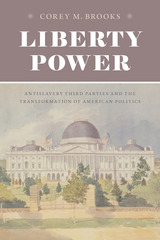 Liberty Power: Antislavery Third Parties and the Transformation of American Politics
Corey M. Brooks
University of Chicago Press, 2015 Abraham Lincoln’s Republican Party was the first party built on opposition to slavery to win on the national stage—but its victory was rooted in the earlier efforts of under-appreciated antislavery third parties. Liberty Power tells the story of how abolitionist activists built the most transformative third-party movement in American history and effectively reshaped political structures in the decades leading up to the Civil War.
As Corey M. Brooks explains, abolitionist trailblazers who organized first the Liberty Party and later the more moderate Free Soil Party confronted formidable opposition from a two-party system expressly constructed to suppress disputes over slavery. Identifying the Whigs and Democrats as the mainstays of the southern Slave Power’s national supremacy, savvy abolitionists insisted that only a party independent of slaveholder influence could wrest the federal government from its grip. A series of shrewd electoral, lobbying, and legislative tactics enabled these antislavery third parties to wield influence far beyond their numbers. In the process, these parties transformed the national political debate and laid the groundwork for the success of the Republican Party and the end of American slavery.
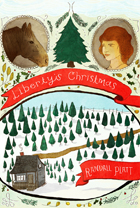 Liberty’s Christmas
Randall Platt
Texas Tech University Press, 2012 Like most everybody else in the middle of the Great Depression, fifteen-year-old Liberty Justice Jones is, well, stuck. But living smack-dab in the Lost Pines of Texas, where any fool can walk into the forest and chop a tree for free, with a debt-burdened mom who’s trying to make a go of this newfangled idea of a Christmas tree farm—that’s stuck bad. Especially if your dream is college.Liberty’s younger brother, Jefferson, is no help, and neither is their addled grandmother. Liberty’s only hope is her own wits. But if she’s so smart, she wonders, why can’t she figure out a way to help their family and get off this wreck of a farm?Learning of the five-hundred-dollar prize for the most beautiful Christmas tree delivered to the state capitol, Liberty hatches a plot. With the aid of their aging draft horse, Quiller, their derelict tractor, Stella, and Rudy, a kid pulled between America and Mexico and fresh off the rails, she’s determined to move a twenty-five-foot tree all the way to Austin in the snow and ice—without getting caught.With the sparkling dialogue and spunky humor that fans have come to love in her heroines, and a perceptive eye and ear for historical detail, award-winning author Randall Platt takes readers young and old on a spirited adventure set in a time when dreams were all many folks had.
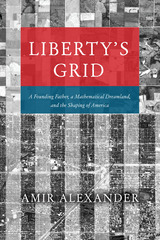 Liberty's Grid: A Founding Father, a Mathematical Dreamland, and the Shaping of America
Amir Alexander
University of Chicago Press, 2024 The surprising history behind a ubiquitous facet of the United States: the gridded landscape.
Seen from an airplane, much of the United States appears to be a gridded land of startling uniformity. Perpendicular streets and rectangular fields, all precisely measured and perfectly aligned, turn both urban and rural America into a checkerboard landscape that stretches from horizon to horizon. In evidence throughout the country, but especially the West, the pattern is a hallmark of American life. One might consider it an administrative convenience—an easy way to divide land and lay down streets—but it is not. The colossal grid carved into the North American continent, argues historian and writer Amir Alexander, is a plan redolent with philosophical and political meaning.
In 1784 Thomas Jefferson presented Congress with an audacious scheme to reshape the territory of the young United States. All western lands, he proposed, would be inscribed with a single rectilinear grid, transforming the natural landscape into a mathematical one. Following Isaac Newton and John Locke, he viewed mathematical space as a blank slate on which anything is possible and where new Americans, acting freely, could find liberty. And if the real America, with its diverse landscapes and rich human history, did not match his vision, then it must be made to match it.
From the halls of Congress to the open prairies, and from the fight against George III to the Trail of Tears, Liberty’s Grid tells the story of the battle between grid makers and their opponents. When Congress endorsed Jefferson’s plan, it set off a struggle over American space that has not subsided. Transcendentalists, urban reformers, and conservationists saw the grid not as a place of possibility but as an artificial imposition that crushed the human spirit. Today, the ideas Jefferson associated with the grid still echo through political rhetoric about the country’s founding, and competing visions for the nation are visible from Manhattan avenues and Kansan pastures to Yosemite’s cliffs and suburbia’s cul-de-sacs. An engrossing read, Liberty’s Grid offers a powerful look at the ideological conflict written on the landscape.
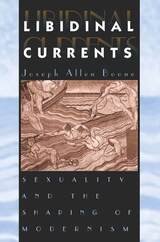 Libidinal Currents: Sexuality and the Shaping of Modernism
Joseph Allen Boone
University of Chicago Press, 1997 From Kate Chopin and Virginia Woolf to William Faulkner and Doris Lessing, modern fiction surges with libidinal currents. The most powerful of these fictions are not merely about sex; rather, they attempt to incorporate the workings of eros into their narrative forms. In doing so, Joseph Allen Boone argues, these modern fictions of sexuality create a politics and poetics of the perverse with the power to transform how we think about and read modernism.
Challenging overarching theories of the novel by carefully mapping the historical contexts that have influenced modern experimental narratives, Boone constructs a model for interpreting sexuality that reaches from Freud's theory of the libidinal instincts to Foucault's theory of sexual discourse. The most ambitious study yet written on the links between literary modernity and the psychology of sex, Boone's Libidinal Currents will be a landmark book in the study of modernist fiction, gay studies/queer theory, feminist criticism, and studies in sexuality and gender.
The Librarian's Atlas: The Shape of Knowledge in Early Modern Spain
Seth Kimmel
University of Chicago Press, 2024 A history of early modern libraries and the imperial desire for total knowledge.
Medieval scholars imagined the library as a microcosm of the world, but as novel early modern ways of managing information facilitated empire in both the New and Old Worlds, the world became a projection of the library. In The Librarian’s Atlas, Seth Kimmel offers a sweeping material history of how the desire to catalog books coincided in the sixteenth and seventeenth centuries with the aspiration to control territory. Through a careful study of library culture in Spain and Morocco—close readings of catalogs, marginalia, indexes, commentaries, and maps—Kimmel reveals how the booklover’s dream of a comprehensive and well-organized library shaped an expanded sense of the world itself.
 The Librarian's Legal Companion for Licensing Information Resources and Services
Tomas A. Lipinski
American Library Association, 2013 Legal expert Lipinski offers a definitive sourcebook for information licensing in libraries, including copyright and contract matters, general contract law concepts, developments in online and information contracting; and the advantages and disadvantages of licensing. Readers will find clear guidance on deciphering the legalese in agreements, advice on negotiating or countering provisions with library-friendly alternatives, and detailed explanations of specific licenses as well as a discussion of issues regarding online and information contracting. Additionally, three special sections provide valuable information in an easy-to-reference format: - Deconstructions of four common license agreements: Access Newspaper Archive, BioOne, Nature Academic, and Amazon.com Kindle
- Answers to 126 questions about specific licensing agreements, plus a glossary, checklist and review tool for evaluating a license agreement
- 20 key issues in licensing agreements, accompanied by sample clauses
You'll save time, money, and unnecessary stress by putting the law on your side with this all-in-one guide to buying and licensing agreements.
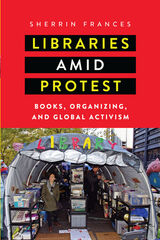 Libraries amid Protest: Books, Organizing, and Global Activism
Sherrin Frances
University of Massachusetts Press, 2020 In September 2011, Occupy Wall Street activists took over New York's Zuccotti Park. Within a matter of weeks, the encampment had become a tiny model of a robust city, with its own kitchen, first aid station, childcare services—and a library of several thousand physical books. Since that time, social movements around the world, from Nuit Debout in Paris to Gezi Park in Istanbul, have built temporary libraries alongside their protests. While these libraries typically last only a few weeks at a time and all have ultimately been dismantled or destroyed, each has managed to collect, catalog, and circulate books, serving a need not being met elsewhere.
Libraries amid Protest unpacks how these protest libraries—labor-intensive, temporary installations in parks and city squares, poorly protected from the weather, at odds with security forces—continue to arise. In telling the stories of these surprising and inspiring spaces through interviews and other research, Sherrin Frances confronts the complex history of American public libraries. She argues that protest libraries function as the spaces of opportunity and resistance promised, but not delivered, by American public libraries.
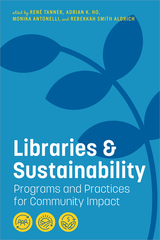 Libraries and Sustainability: Programs and Practices for Community Impact
René Tanner, Adrian K. Ho, Monika Antonelli, and Rebekkah Smith Aldrich
American Library Association, 2021 Library workers at all types of organizations, as well as LIS students learning about this newest Core Value of Librarianship, will find this book an easy-to-digest introduction to what staff at a range of libraries have accomplished in incorporating sustainability into their decision making and professional practices. In addition, a discussion about the role of economics and sustainability will challenge readers to stretch in new ways to positively impact their communities. As a core value of librarianship, sustainability is not an end point but a mindset, a lens through which operational and outreach decisions can be made. And it extends beyond an awareness of the roles that libraries can play in educating and advocating for a sustainable future. As the programs and practices in this resource demonstrate, sustainability can also encompass engaging with communities in discussions about resilience, regeneration, and social justice. Inspiring yet assuredly pragmatic, the many topics explored in this book edited by members of ALA's Sustainability Round Table and ALA’s Special Task Force on Sustainability include - a discussion of why sustainability matters to libraries and their user communities;
- real-life examples of sustainability programming, transformative community partnerships, collective responses for climate resilience, and green building practices;
- lessons learned and recommendations from library workers who have been active in putting sustainability into practice;
- the intersection of sustainability with the work of equity, diversity, and inclusion;
- suggestions regarding the revision of library and information science curriculum in light of the practical need to build community resilience;
- an examination of how libraries’ efforts to support Doughnut Economics can bolster the United Nations' work on the Sustainable Development Goals, which seek to address the global impacts of climate change; and
- potential collaborators for future sustainability-related initiatives.
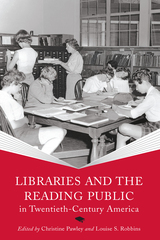 Libraries and the Reading Public in Twentieth-Century America
Edited by Christine Pawley and Louise S. Robbins
University of Wisconsin Press, 2013 For well over one hundred years, libraries open to the public have played a crucial part in fostering in Americans the skills and habits of reading and writing, by routinely providing access to standard forms of print: informational genres such as newspapers, pamphlets, textbooks, and other reference books, and literary genres including poetry, plays, and novels. Public libraries continue to have an extraordinary impact; in the early twenty-first century, the American Library Association reports that there are more public library branches than McDonald's restaurants in the United States. Much has been written about libraries from professional and managerial points of view, but less so from the perspectives of those most intimately involved—patrons and librarians. Drawing on circulation records, patron reviews, and other archived materials, Libraries and the Reading Public in Twentieth-Century America underscores the evolving roles that libraries have played in the lives of American readers. Each essay in this collection examines a historical circumstance related to reading in libraries. The essays are organized in sections on methods of researching the history of reading in libraries; immigrants and localities; censorship issues; and the role of libraries in providing access to alternative, nonmainstream publications. The volume shows public libraries as living spaces where individuals and groups with diverse backgrounds, needs, and desires encountered and used a great variety of texts, images, and other media throughout the twentieth century.
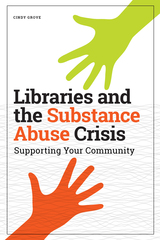 Libraries and the Substance Abuse Crisis: Supporting Your Community
Cindy Grove
American Library Association, 2020 The opioid epidemic, and other behavioral health issues such as alcohol and drug abuse, directly impact every community across the nation; and, by extension, public libraries’ daily work. Because libraries are not only trusted guardians of information but also vital community centers, people struggling with addictive behaviors as well as their family members and friends often turn to the library for help. But many library workers feel overwhelmed, finding themselves unprepared for serving these patrons in an effective and empathetic way. This book encourages readers to turn their fears and uncertainty into strengths and empowerment, offering to-the-point guidance on welcoming people with substance use disorders and their loved ones through policy, materials, outreach, collaboration, programs, and services. Written by a frontline librarian whose personal experiences inform the book, this resource - explores the library’s role in the fight against addiction and how to become part of the solution by combating stigma;
- provides background on understanding how substance abuse and related behaviors affect different age groups and populations;
- explains how to be proactive regarding library safety and security by carefully crafting library policies and effectively communicating them to staff;
- offers real world guidance on training library staff, including pointers on recognizing observable signs of drug abuse and responding appropriately and safely to uncomfortable or potentially dangerous situations;
- discusses safeguards such as a needle disposal unit, defibrillator, and Naloxone;
- gives tips on marketing, outreach, and programming, from putting together displays of materials and resources to partnering with local organizations; and
- recommends useful websites, documentaries, and additional resources for further learning.
 Libraries and Universities: Addresses and Reports
Paul Buck
Harvard University Press Perhaps the most exciting aspect of the Harvard University Library today is that in this largest university library in the world primary emphasis is placed upon a regard for the individual which extends alike to staff, faculty, students, and general users. As director of the Library, Paul Buck was responsible for this attitude. This book reflects his view that as the center of university education and research a library owes a responsibility both to the people who use libraries and to those who operate them. Personal consideration must be united with the mechanization and automation that is essential in developing a modern library's collections, circulation, and special services.
Here are addresses, articles, and reports in which Mr. Buck interprets the Harvard Library to its own staff, to the academic community, and to the general public. For the general reader who wants to know something of the nature and significance of university libraries, the author presents a historical view as well as an interesting picture of what the largest library of its kind is doing today.
The collection begins with a talk given at Monticello in 1954 in which Mr. Buck announced his university library credo, emphasizing the importance of the university library, its personnel, and its services to the community. This credo he restates at the end of this volume. Throughout the book are speeches bearing on the author's conception of libraries for teaching and research as well as a description of the administrative program at Harvard that he based on this conception.
He analyzes problems involved in recruiting, training, and retaining a quality staff of professional librarians. In one article he deals with the new personnel program adopted by the Harvard Library in 1958. In another he is concerned with the remarkably successful plan for recruiting "library interns" that is now in operation at Harvard. Still another paper discusses a landmark of his administration, the installation of a mechanized circulation system.
Included here also are addresses reflecting Mr. Buck's broad historical perspective. He deals with the long-range future of libraries generally and with the prospects of American universities. He is concerned with relations between historians, librarians, and businessmen. In a short paper he touches on another landmark of his administration--the first steps taken in planning the John F. Kennedy library.
Libraries As Agencies Of Culture: (Volume 42, No. 3 Of American Studies)
Thomas Augst
University of Wisconsin Press, 2002 Libraries—public, school, and academic libraries—are ubiquitous cultural agencies. Yet how much do we know about the multiple ways that they serve and enrich our culture? These essays explore the role of the library in the life of the reader and the library as a place in the life of its users. Contributors are Thomas Augst, Ari Kelman, Elizabeth Jane Aikin, Ronald J. Zboray and Mary Saracino Zboray, Christine Pawley, Juris Dilevko and Lisa Gottlieb, Jean L. Preer, Jacalyn Eddy, Benjamin Hufbauer, and Emily B. Todd.
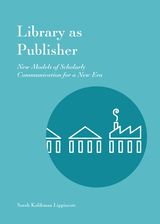 Library as Publisher: New Models of Scholarly Communication for a New Era
Sarah Kalikman Lippincott
Against the Grain, LLC, 2017 Charleston Briefings: Trending Topics for Information Professionals is a thought-provoking series of brief books concerning innovation in the sphere of libraries, publishing, and technology in scholarly communication. The briefings, growing out of the vital conversations characteristic of the Charleston Conference and Against the Grain, will offer valuable insights into the trends shaping our professional lives and the institutions in which we work. The Charleston Briefings are written by authorities who provide an effective, readable overview of their topics—not an academic monograph. The intended audience is busy nonspecialist readers who want to be informed concerning important issues in our industry in an accessible and timely manner. Why are so many libraries going into the publishing business at a time when scholarly publishing is facing so many challenges? Publishing, after all, is a complex business, and the trend in the marketplace is to economies of scale and the consolidation of smaller publishers into the fold of the largest. It does not seem a propitious moment for a library to become a small independent publisher. So why are libraries doing this? How is this similar or different from the services commercial publishers provide? Does it involve offering the same services, or are new models, types of content, and needs resulting in new solutions that suit new players? This book will help the reader understand the context of library publishing. It also explores when a publishing program is a good fit for a library and provides guidance for defining, launching, or growing a publishing initiative.
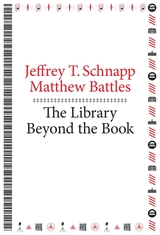 The Library Beyond the Book
Jeffrey T. Schnapp and Matthew Battles
Harvard University Press With textbook readers and digital downloads proliferating, it is easy to imagine a time when printed books will vanish. Such forecasts miss the mark, argue Jeffrey Schnapp and Matthew Battles. Future bookshelves will not be wholly virtual, and libraries will thrive—although in a variety of new social, cultural, and architectural forms. Schnapp and Battles combine deep study of the library’s history with a record of institutional and technical innovation at metaLAB, a research group at the forefront of the digital humanities. They gather these currents in The Library Beyond the Book, exploring what libraries have been in the past to speculate on what they will become: hybrid places that intermingle books and ebooks, analog and digital formats, paper and pixels.
Libraries have always been mix-and-match spaces, and remix is their most plausible future scenario. Speculative and provocative, The Library Beyond the Book explains book culture for a world where the physical and the virtual blend with ever increasing intimacy.
A Library Classification for City and Regional Planning
Caroline Shillaber
Harvard University Press, 1973 The myriad developments in city and regional planning over the last sixty years are reflected in this revision of the 1913 publication, City Planning: A Comprehensive Analysis of the Subject Arranged for the Classification of Books, Plans, Photographs, Notes, and Other Collected Material with Alphabetic Subject Index. Caroline Shillaber, who is Librarian of the Graduate School of Design, Harvard University, also includes in this volume a revision of the 1937 publication State and National Planning by Arthur C. Comey and Katherine McNamara. The major additions include techniques of urban analysis using computers and mathematical models, technological developments, and concepts of urban design and planning and the interrelation of areas with the total environment.
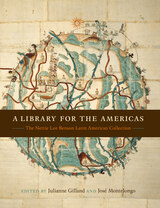 A Library for the Americas: The Nettie Lee Benson Latin American Collection
Edited by Julianne Gilland and José Montelongo
University of Texas Press, 2018 Founded in 1921, the Nettie Lee Benson Latin American Collection at the University of Texas at Austin has become one of the world’s great libraries for the study of Latin America, as well as the largest university library collection of Latin American materials in the United States. Encompassing all areas of the Western Hemisphere that were ever part of the Spanish or Portuguese empires, the Benson Collection documents Latin American history and culture from the first European contacts to the current activities of Latinas/os in the United States. Scholars, students, and members of the public from around the world regularly use the multifaceted, multimedia resources of the Benson. Showcasing the incredible depth, diversity, and history of the Benson Collection, A Library for the Americas presents rare books and manuscripts, maps, photographs, music, oral histories, art and objects dating from the early 1500s to the present. Images of and captions for these materials are paired with a series of essays and reflections by distinguished scholars of Latin American and Latina/o studies, who describe the role that the Benson Collection has played in the research and intellectual contributions that have defined their careers. As a whole, the book celebrates the remarkable place for learning that is the Benson Collection, while not shying away from larger questions about what it means to have a monumental library and archive devoted to Latin America in the United States.
 The Library Liaison's Training Guide to Collection Management
Alison M. Armstrong
American Library Association, 2020 Library liaisons often have primary jobs that do not involve collection development, but their familiarity with collection practices makes all the difference in faculty relations. And time pressures mean that on-boarding needs to be as streamlined as possible. This concise, field-tested training manual will put your liaison on solid footing. Plus, end of the chapter prompts make it easy to tailor your approach to local practices. With the help of this resource, your new liaison will get up to speed on such topics as - tracking budget balances in assigned departments;
- differentiating between the needs of an individual faculty member and their department;
- how to say no to monograph requests;
- benchmarking titles with peer institutions or coordinating within a consortium;
- 17 questions to ask when evaluating a database;
- considerations when making weeding decisions;
- four key conversations to have annually between liaisons and collection development librarians; and
- gathering data for program accreditation reports.
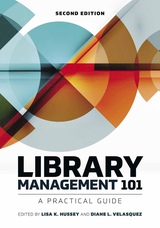 Library Management 101: A Practical Guide
Lisa K. Hussey
American Library Association, 2019 Just because a set of responsibilities isn’t formally called management doesn’t mean that it isn’t management. And this vital text speaks to a reality that all current professionals already know: that is, everyone studying to enter the profession needs an introduction to the topic of management. Because no matter what one’s role in an academic or public library context, it will involve decision-making, planning, and organization skills. Newly revised and updated, this book pulls together management best practices from library management experts teaching in LIS programs across the U.S. and Canada. Among the many topics discussed are - classic and contemporary theories of management, and how they apply to the library;
- human resource planning;
- marketing and public relations;
- negotiations, mediation, and financial management of the library;
- facilities management;
- information technology management and future trends;
- change management, organizational culture; and
- ethics and confidentiality.
 Library Marketing and Communications: Strategies to Increase Relevance and Results
Cordelia Anderson
American Library Association, 2020 Effectively marketing libraries by persuasively communicating their relevance is key to ensuring their future. Speaking directly to those in senior leadership positions, Anderson lays out the structural and organizational changes needed to help libraries answer the relevance question and maximize their marketing and communications efforts. Focusing on big-picture strategies, she shares lessons learned from her 20+ year career in library marketing and communications. No matter what type or size of library you help to lead, by reading this book you will - gain insight into why libraries need to tell their stories more effectively than they are today;
- be able to craft a strategic roadmap for marketing your library and communicating its value in a variety of ways that resonate with key audiences;
- see why improvements to the structure of your marketing and communications team can lead to better results;
- learn practical methods for incorporating audience research into your planning;
- know how to remove customer barriers and discontinue practices that are thwarting your marketing efforts;
- receive guidance on preparing for potential crises;
- understand how to be more community-focused by forming and sustaining partnerships; and
- feel confident in engaging with stakeholders so that they become your library’s best ambassadors.
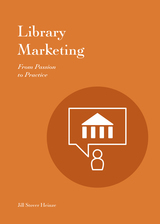 Library Marketing: From Passion to Practice
Jill Stover Heinze
Against the Grain, LLC, 2017 Charleston Briefings: Trending Topics for Information Professionals is a thought-provoking series of brief books concerning innovation in the sphere of libraries, publishing, and technology in scholarly communication. The briefings, growing out of the vital conversations characteristic of the Charleston Conference and Against the Grain, will offer valuable insights into the trends shaping our professional lives and the institutions in which we work. The Charleston Briefings are written by authorities who provide an effective, readable overview of their topics—not an academic monograph. The intended audience is busy nonspecialist readers who want to be informed concerning important issues in our industry in an accessible and timely manner. Why do librarians have so many problems with marketing? At a time when universities and colleges demand that libraries demonstrate their value and users have so many other options to discover information, it seems bizarre that librarians would be so much against a tool that allows them to engage closely with the very users who are the lifeblood of libraries. As Jill Heinze makes clear in this lively and passionate briefing, marketing is a tool that allows an institution to assess their place in a market and to communicate value to their users based on the users’ needs and problems. This marketing tool need have no relationship to traditional business concerns, and, indeed, mission- based marketing is now important even to for- profit institutions. Embracing key marketing concepts and planning, says Heinze, can demand that libraries rethink organizational structures, operations, and missions, but she also demonstrates that this rethinking can be entirely commensurate with the mission of libraries within an educational context.
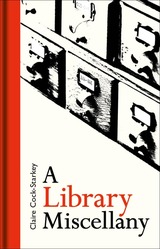 A Library Miscellany
Claire Cock-Starkey
Bodleian Library Publishing, 2018 What can be found in the Vatican’s Secret Archive? How many books did Charles Darwin’s library aboard the Beagle hold? Which library is home to a colony of bats?
Bursting with potted histories, quirky facts, and enlightening lists, this book explores every aspect of the library, celebrating these remarkable institutions as well as the individuals behind their inspiring collections. From the ancient library at Alexandria to the Library of Congress in Washington DC, and from university libraries to those of humble villages, A Library Miscellany explores institutions both old and new. Opening the door to unusual collections such as herbaria, art libraries, magic libraries, and even the “library of smells,” this book also charts the difficulties of cataloging books deemed to be subversive, heretical, libelous, or obscene.
Packed with unusual facts and statistics, this is the perfect gift for library enthusiasts, bibliophiles, collectors, and readers everywhere.
 Library Next: Seven Action Steps for Reinvention
Catherine Murray-Rust
American Library Association, 2021 After a career of more than 40 years, Murray-Rust, former Dean of Libraries at Georgia Tech and a self-proclaimed library disrupter, sees our profession’s central challenge as simply this: how to turn the library outward in order to make a difference in the lives of individuals and the community. In this book she encourages readers to look an uncertain library future square in the eye. She shares stories from her transformational years at Georgia Tech Libraries which present both inspiration and practical advice on how to stand up for values while changing the ways we act upon them. Organized around seven action steps for change, this book offers takeaways and activities you can adapt to your work style and organizational culture. You will learn from such stories and lessons as - the three different kinds of information you need for measuring impact;
- using new frameworks, outside fragmented, risk-adverse library structures, to get the work done;
- the limitations of trying to manage your way through major cultural change;
- embedding in the community to develop visions and strategies for improvement;
- painful and challenging times that set Murray-Rust on a path of self-learning;
- how an uncomfortable assignment led to a sought-after seat at the table for a university-wide capital construction project;
- the bold promise that got the library onto the high-priority list for renovation;
- visiting a Toyota plant to learn how to encourage employee engagement and creativity; and
- learning to listen with the "turning outward" philosophy of Harwood Institute.
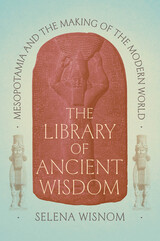 The Library of Ancient Wisdom: Mesopotamia and the Making of the Modern World
Selena Wisnom
University of Chicago Press, 2025 A tour of an ancient library transports us to Mesopotamia, introducing us to its people, their ideas, and their humanity.
The library of Ashurbanipal, Assyria’s last great king, held an astonishing collection at the forefront of knowledge in its day, from ancient traditions in religion and literature to the latest developments in magic and medicine. When the Assyrian empire fell, the library burned to the ground, and its contents, clay tablets inscribed with cuneiform writing, lay buried for thousands of years until a team of Victorian archaeologists discovered the remnants in modern-day Iraq. The clay had baked and hardened; the very fire that consumed the library had helped its texts to survive for millennia.
In The Library of Ancient Wisdom, scholar Selena Wisnom, one of only a few hundred experts able to read cuneiform script today, guides us inside this important collection and, through its contents, brings ancient Mesopotamia and its people to life. Introducing us to Ashurbanipal and his family, scribes, astrologers, physicians, and more, Wisnom explores the library’s tablets and the details they divulge about how these ancient people thought about the world. Like us, they had concerns about job security, jealous rivalries, and profound friendships, and questions about the meaning of life. Wisnom ushers us into a world where magic was commonplace, where the gods spoke to you in dreams, and where the secrets of the universe were revealed through puns—taking us to the heart of what it means to be human.
Offering a close look at a major historical landmark as well as a readable account of the world’s earliest civilizations, The Library of Ancient Wisdom lays bare the ideas, hopes, fears, and desires that survive on humble clay.
 The Library of Ancient Wisdom: Mesopotamia and the Making of the Modern World
Selena Wisnom
University of Chicago Press, 2025 This is an audiobook version of this book.
A tour of an ancient library transports us to Mesopotamia, introducing us to its people, their ideas, and their humanity.
The library of Ashurbanipal, Assyria’s last great king, held an astonishing collection at the forefront of knowledge in its day, from ancient traditions in religion and literature to the latest developments in magic and medicine. When the Assyrian empire fell, the library burned to the ground, and its contents, clay tablets inscribed with cuneiform writing, lay buried for thousands of years until a team of Victorian archaeologists discovered the remnants in modern-day Iraq. The clay had baked and hardened; the very fire that consumed the library had helped its texts to survive for millennia.
In The Library of Ancient Wisdom, scholar Selena Wisnom, one of only a few hundred experts able to read cuneiform script today, guides us inside this important collection and, through its contents, brings ancient Mesopotamia and its people to life. Introducing us to Ashurbanipal and his family, scribes, astrologers, physicians, and more, Wisnom explores the library’s tablets and the details they divulge about how these ancient people thought about the world. Like us, they had concerns about job security, jealous rivalries, and profound friendships, and questions about the meaning of life. Wisnom ushers us into a world where magic was commonplace, where the gods spoke to you in dreams, and where the secrets of the universe were revealed through puns—taking us to the heart of what it means to be human.
Offering a close look at a major historical landmark as well as a readable account of the world’s earliest civilizations, The Library of Ancient Wisdom lays bare the ideas, hopes, fears, and desires that survive on humble clay.
Library of History, Volume I: Books 1–2.34
Diodorus Siculus
Harvard University Press Remains of a universal chronicle.
Diodorus Siculus, Greek historian of Agyrium in Sicily (ca. 80–20 BC), wrote forty books of world history, called Library of History, in three parts: mythical history of peoples, non-Greek and Greek, to the Trojan War; history to Alexander’s death (323 BC); history to 54 BC. Of this we have complete Books 1–5 (Egyptians, Assyrians, Ethiopians, Greeks) and Books 11–20 (Greek history 480–302 BC); and fragments of the rest. He was an uncritical compiler, but used good sources and reproduced them faithfully. He is valuable for details unrecorded elsewhere, and as evidence for works now lost, especially writings of Ephorus, Apollodorus, Agatharchides, Philistus, and Timaeus.
The Loeb Classical Library edition of Diodorus Siculus is in twelve volumes.
Library of History, Volume II: Books 2.35–4.58
Diodorus Siculus
Harvard University Press Remains of a universal chronicle.
Diodorus Siculus, Greek historian of Agyrium in Sicily (ca. 80–20 BC), wrote forty books of world history, called Library of History, in three parts: mythical history of peoples, non-Greek and Greek, to the Trojan War; history to Alexander’s death (323 BC); history to 54 BC. Of this we have complete Books 1–5 (Egyptians, Assyrians, Ethiopians, Greeks) and Books 11–20 (Greek history 480–302 BC); and fragments of the rest. He was an uncritical compiler, but used good sources and reproduced them faithfully. He is valuable for details unrecorded elsewhere, and as evidence for works now lost, especially writings of Ephorus, Apollodorus, Agatharchides, Philistus, and Timaeus.
The Loeb Classical Library edition of Diodorus Siculus is in twelve volumes.
Library of History, Volume III: Books 4.59–8
Diodorus Siculus
Harvard University Press Remains of a universal chronicle.
Diodorus Siculus, Greek historian of Agyrium in Sicily (ca. 80–20 BC), wrote forty books of world history, called Library of History, in three parts: mythical history of peoples, non-Greek and Greek, to the Trojan War; history to Alexander’s death (323 BC); history to 54 BC. Of this we have complete Books 1–5 (Egyptians, Assyrians, Ethiopians, Greeks) and Books 11–20 (Greek history 480–302 BC); and fragments of the rest. He was an uncritical compiler, but used good sources and reproduced them faithfully. He is valuable for details unrecorded elsewhere, and as evidence for works now lost, especially writings of Ephorus, Apollodorus, Agatharchides, Philistus, and Timaeus.
The Loeb Classical Library edition of Diodorus Siculus is in twelve volumes.
Library of History, Volume IV: Books 9–12.40
Diodorus Siculus
Harvard University Press Remains of a universal chronicle.
Diodorus Siculus, Greek historian of Agyrium in Sicily (ca. 80–20 BC), wrote forty books of world history, called Library of History, in three parts: mythical history of peoples, non-Greek and Greek, to the Trojan War; history to Alexander’s death (323 BC); history to 54 BC. Of this we have complete Books 1–5 (Egyptians, Assyrians, Ethiopians, Greeks) and Books 11–20 (Greek history 480–302 BC); and fragments of the rest. He was an uncritical compiler, but used good sources and reproduced them faithfully. He is valuable for details unrecorded elsewhere, and as evidence for works now lost, especially writings of Ephorus, Apollodorus, Agatharchides, Philistus, and Timaeus.
The Loeb Classical Library edition of Diodorus Siculus is in twelve volumes.
Library of History, Volume IX: Books 18–19.65
Diodorus Siculus
Harvard University Press, 2004 Remains of a universal chronicle.
Diodorus Siculus, Greek historian of Agyrium in Sicily (ca. 80–20 BC), wrote forty books of world history, called Library of History, in three parts: mythical history of peoples, non-Greek and Greek, to the Trojan War; history to Alexander’s death (323 BC); history to 54 BC. Of this we have complete Books 1–5 (Egyptians, Assyrians, Ethiopians, Greeks) and Books 11–20 (Greek history 480–302 BC); and fragments of the rest. He was an uncritical compiler, but used good sources and reproduced them faithfully. He is valuable for details unrecorded elsewhere, and as evidence for works now lost, especially writings of Ephorus, Apollodorus, Agatharchides, Philistus, and Timaeus.
The Loeb Classical Library edition of Diodorus Siculus is in twelve volumes.
Library of History, Volume V: Books 12.41–13
Diodorus Siculus
Harvard University Press Remains of a universal chronicle.
Diodorus Siculus, Greek historian of Agyrium in Sicily (ca. 80–20 BC), wrote forty books of world history, called Library of History, in three parts: mythical history of peoples, non-Greek and Greek, to the Trojan War; history to Alexander’s death (323 BC); history to 54 BC. Of this we have complete Books 1–5 (Egyptians, Assyrians, Ethiopians, Greeks) and Books 11–20 (Greek history 480–302 BC); and fragments of the rest. He was an uncritical compiler, but used good sources and reproduced them faithfully. He is valuable for details unrecorded elsewhere, and as evidence for works now lost, especially writings of Ephorus, Apollodorus, Agatharchides, Philistus, and Timaeus.
The Loeb Classical Library edition of Diodorus Siculus is in twelve volumes.
Library of History, Volume VI: Books 14–15.19
Diodorus Siculus
Harvard University Press Remains of a universal chronicle.
Diodorus Siculus, Greek historian of Agyrium in Sicily (ca. 80–20 BC), wrote forty books of world history, called Library of History, in three parts: mythical history of peoples, non-Greek and Greek, to the Trojan War; history to Alexander’s death (323 BC); history to 54 BC. Of this we have complete Books 1–5 (Egyptians, Assyrians, Ethiopians, Greeks) and Books 11–20 (Greek history 480–302 BC); and fragments of the rest. He was an uncritical compiler, but used good sources and reproduced them faithfully. He is valuable for details unrecorded elsewhere, and as evidence for works now lost, especially writings of Ephorus, Apollodorus, Agatharchides, Philistus, and Timaeus.
The Loeb Classical Library edition of Diodorus Siculus is in twelve volumes.
Library of History, Volume VII: Books 15.20–16.65
Diodorus Siculus
Harvard University Press Remains of a universal chronicle.
Diodorus Siculus, Greek historian of Agyrium in Sicily (ca. 80–20 BC), wrote forty books of world history, called Library of History, in three parts: mythical history of peoples, non-Greek and Greek, to the Trojan War; history to Alexander’s death (323 BC); history to 54 BC. Of this we have complete Books 1–5 (Egyptians, Assyrians, Ethiopians, Greeks) and Books 11–20 (Greek history 480–302 BC); and fragments of the rest. He was an uncritical compiler, but used good sources and reproduced them faithfully. He is valuable for details unrecorded elsewhere, and as evidence for works now lost, especially writings of Ephorus, Apollodorus, Agatharchides, Philistus, and Timaeus.
The Loeb Classical Library edition of Diodorus Siculus is in twelve volumes.
Library of History, Volume VIII: Books 16.66–17
Diodorus Siculus
Harvard University Press Remains of a universal chronicle.
Diodorus Siculus, Greek historian of Agyrium in Sicily (ca. 80–20 BC), wrote forty books of world history, called Library of History, in three parts: mythical history of peoples, non-Greek and Greek, to the Trojan War; history to Alexander’s death (323 BC); history to 54 BC. Of this we have complete Books 1–5 (Egyptians, Assyrians, Ethiopians, Greeks) and Books 11–20 (Greek history 480–302 BC); and fragments of the rest. He was an uncritical compiler, but used good sources and reproduced them faithfully. He is valuable for details unrecorded elsewhere, and as evidence for works now lost, especially writings of Ephorus, Apollodorus, Agatharchides, Philistus, and Timaeus.
The Loeb Classical Library edition of Diodorus Siculus is in twelve volumes.
Library of History, Volume X: Books 19.66–20
Diodorus Siculus
Harvard University Press Remains of a universal chronicle.
Diodorus Siculus, Greek historian of Agyrium in Sicily (ca. 80–20 BC), wrote forty books of world history, called Library of History, in three parts: mythical history of peoples, non-Greek and Greek, to the Trojan War; history to Alexander’s death (323 BC); history to 54 BC. Of this we have complete Books 1–5 (Egyptians, Assyrians, Ethiopians, Greeks) and Books 11–20 (Greek history 480–302 BC); and fragments of the rest. He was an uncritical compiler, but used good sources and reproduced them faithfully. He is valuable for details unrecorded elsewhere, and as evidence for works now lost, especially writings of Ephorus, Apollodorus, Agatharchides, Philistus, and Timaeus.
The Loeb Classical Library edition of Diodorus Siculus is in twelve volumes.
Library of History, Volume XI: Books 21–32
Diodorus Siculus
Harvard University Press Remains of a universal chronicle.
Diodorus Siculus, Greek historian of Agyrium in Sicily (ca. 80–20 BC), wrote forty books of world history, called Library of History, in three parts: mythical history of peoples, non-Greek and Greek, to the Trojan War; history to Alexander’s death (323 BC); history to 54 BC. Of this we have complete Books 1–5 (Egyptians, Assyrians, Ethiopians, Greeks) and Books 11–20 (Greek history 480–302 BC); and fragments of the rest. He was an uncritical compiler, but used good sources and reproduced them faithfully. He is valuable for details unrecorded elsewhere, and as evidence for works now lost, especially writings of Ephorus, Apollodorus, Agatharchides, Philistus, and Timaeus.
The Loeb Classical Library edition of Diodorus Siculus is in twelve volumes.
Library of History, Volume XII: Books 33–40. Index
Diodorus Siculus
Harvard University Press Remains of a universal chronicle.
Diodorus Siculus, Greek historian of Agyrium in Sicily (ca. 80–20 BC), wrote forty books of world history, called Library of History, in three parts: mythical history of peoples, non-Greek and Greek, to the Trojan War; history to Alexander’s death (323 BC); history to 54 BC. Of this we have complete Books 1–5 (Egyptians, Assyrians, Ethiopians, Greeks) and Books 11–20 (Greek history 480–302 BC); and fragments of the rest. He was an uncritical compiler, but used good sources and reproduced them faithfully. He is valuable for details unrecorded elsewhere, and as evidence for works now lost, especially writings of Ephorus, Apollodorus, Agatharchides, Philistus, and Timaeus.
The Loeb Classical Library edition of Diodorus Siculus is in twelve volumes.
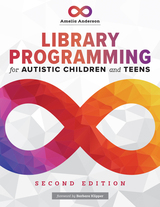 Library Programming for Autistic Children and Teens
Amelia Anderson and Barbara Klipper
American Library Association, 2021 Foreword by Barbara Klipper Since the first edition of this landmark guide was published, there has been increased interest in services for library patrons on the autism spectrum; indeed, more people of all ages now self-identify as autistic. Those who understand the unique characteristics of autistic young people know that ordinary library programming guides are not up to the task of effectively serving these library users. Well qualified to speak to this need, Anderson is an educator, library researcher, and former public librarian who has helped to develop two IMLS funded initiatives that train library workers to better understand and serve autistic patrons. Here, she offers librarians who work with children and teens in both public library and K-12 educational settings an updated, comprehensive resource that includes - an updated introduction to the basics of autism, including language, symbolism, and best practices in the library rooted in the principles of Universal Design;
- step-by-step programs from librarians across the country, adaptable for both public and school library settings, that are cost-effective and easy to replicate;
- contributions from autistic self-advocates throughout the text, demonstrating that the program ideas included are truly designed with their preferences in mind;
- suggestions for securing funding and establishing partnerships with community organizations; and
- many helpful appendices, with handy resources for training and education, building a collection, storytimes, sensory integration activities, and a “Tips for a Successful Library Visit” template.
The Library Quarterly, volume 91 number 3 (July 2021)
The University of Chicago Press
University of Chicago Press Journals, 2021 This is volume 91 issue 3 of The Library Quarterly. The Library Quarterly (LQ) embraces a wide array of original research perspectives, approaches, and quantitative, qualitative, evaluative, analytic, and mixed methodology to assess the role of libraries in communities and in society. Through unique and innovative content that positions libraries at the nexus of information, community, and policy, LQ publishes cutting-edge articles, essays, editorials, and reviews that inform, enable, equalize, and lead. Across these areas, all content in the journal ties to contemporary issues impacting libraries and librarianship.
The Library Quarterly, volume 91 number 4 (October 2021)
The University of Chicago Press
University of Chicago Press Journals, 2021 This is volume 91 issue 4 of The Library Quarterly. The Library Quarterly (LQ) embraces a wide array of original research perspectives, approaches, and quantitative, qualitative, evaluative, analytic, and mixed methodology to assess the role of libraries in communities and in society. Through unique and innovative content that positions libraries at the nexus of information, community, and policy, LQ publishes cutting-edge articles, essays, editorials, and reviews that inform, enable, equalize, and lead. Across these areas, all content in the journal ties to contemporary issues impacting libraries and librarianship.
The Library Quarterly, volume 92 number 1 (January 2022)
The University of Chicago Press
University of Chicago Press Journals, 2022 This is volume 92 issue 1 of The Library Quarterly. The Library Quarterly (LQ) embraces a wide array of original research perspectives, approaches, and quantitative, qualitative, evaluative, analytic, and mixed methodology to assess the role of libraries in communities and in society. Through unique and innovative content that positions libraries at the nexus of information, community, and policy, LQ publishes cutting-edge articles, essays, editorials, and reviews that inform, enable, equalize, and lead. Across these areas, all content in the journal ties to contemporary issues impacting libraries and librarianship.
The Library Quarterly, volume 92 number 2 (April 2022)
The University of Chicago Press
University of Chicago Press Journals, 2022 This is volume 92 issue 2 of The Library Quarterly. The Library Quarterly (LQ) embraces a wide array of original research perspectives, approaches, and quantitative, qualitative, evaluative, analytic, and mixed methodology to assess the role of libraries in communities and in society. Through unique and innovative content that positions libraries at the nexus of information, community, and policy, LQ publishes cutting-edge articles, essays, editorials, and reviews that inform, enable, equalize, and lead. Across these areas, all content in the journal ties to contemporary issues impacting libraries and librarianship.
The Library Quarterly, volume 92 number 3 (July 2022)
The University of Chicago Press
University of Chicago Press Journals, 2022 This is volume 92 issue 3 of The Library Quarterly. The Library Quarterly (LQ) embraces a wide array of original research perspectives, approaches, and quantitative, qualitative, evaluative, analytic, and mixed methodology to assess the role of libraries in communities and in society. Through unique and innovative content that positions libraries at the nexus of information, community, and policy, LQ publishes cutting-edge articles, essays, editorials, and reviews that inform, enable, equalize, and lead. Across these areas, all content in the journal ties to contemporary issues impacting libraries and librarianship.
The Library Quarterly, volume 92 number 4 (October 2022)
The University of Chicago Press
University of Chicago Press Journals, 2022 This is volume 92 issue 4 of The Library Quarterly. The Library Quarterly (LQ) embraces a wide array of original research perspectives, approaches, and quantitative, qualitative, evaluative, analytic, and mixed methodology to assess the role of libraries in communities and in society. Through unique and innovative content that positions libraries at the nexus of information, community, and policy, LQ publishes cutting-edge articles, essays, editorials, and reviews that inform, enable, equalize, and lead. Across these areas, all content in the journal ties to contemporary issues impacting libraries and librarianship.
The Library Quarterly, volume 93 number 1 (January 2023)
The University of Chicago Press
University of Chicago Press Journals, 2023 This is volume 93 issue 1 of The Library Quarterly. The Library Quarterly (LQ) embraces a wide array of original research perspectives, approaches, and quantitative, qualitative, evaluative, analytic, and mixed methodology to assess the role of libraries in communities and in society. Through unique and innovative content that positions libraries at the nexus of information, community, and policy, LQ publishes cutting-edge articles, essays, editorials, and reviews that inform, enable, equalize, and lead. Across these areas, all content in the journal ties to contemporary issues impacting libraries and librarianship.
The Library Quarterly, volume 93 number 2 (April 2023)
The University of Chicago Press
University of Chicago Press Journals, 2023 This is volume 93 issue 2 of The Library Quarterly. The Library Quarterly (LQ) embraces a wide array of original research perspectives, approaches, and quantitative, qualitative, evaluative, analytic, and mixed methodology to assess the role of libraries in communities and in society. Through unique and innovative content that positions libraries at the nexus of information, community, and policy, LQ publishes cutting-edge articles, essays, editorials, and reviews that inform, enable, equalize, and lead. Across these areas, all content in the journal ties to contemporary issues impacting libraries and librarianship.
The Library Quarterly, volume 94 number 1 (January 2024)
The University of Chicago Press
University of Chicago Press Journals, 2024 This is volume 94 issue 1 of The Library Quarterly. The Library Quarterly (LQ) embraces a wide array of original research perspectives, approaches, and quantitative, qualitative, evaluative, analytic, and mixed methodology to assess the role of libraries in communities and in society. Through unique and innovative content that positions libraries at the nexus of information, community, and policy, LQ publishes cutting-edge articles, essays, editorials, and reviews that inform, enable, equalize, and lead. Across these areas, all content in the journal ties to contemporary issues impacting libraries and librarianship.
The Library Quarterly, volume 94 number 2 (April 2024)
The University of Chicago Press
University of Chicago Press Journals, 2024 This is volume 94 issue 2 of The Library Quarterly. The Library Quarterly (LQ) embraces a wide array of original research perspectives, approaches, and quantitative, qualitative, evaluative, analytic, and mixed methodology to assess the role of libraries in communities and in society. Through unique and innovative content that positions libraries at the nexus of information, community, and policy, LQ publishes cutting-edge articles, essays, editorials, and reviews that inform, enable, equalize, and lead. Across these areas, all content in the journal ties to contemporary issues impacting libraries and librarianship.
The Library Quarterly, volume 94 number 3 (July 2024)
The University of Chicago Press
University of Chicago Press Journals, 2024 This is volume 94 issue 3 of The Library Quarterly. The Library Quarterly (LQ) embraces a wide array of original research perspectives, approaches, and quantitative, qualitative, evaluative, analytic, and mixed methodology to assess the role of libraries in communities and in society. Through unique and innovative content that positions libraries at the nexus of information, community, and policy, LQ publishes cutting-edge articles, essays, editorials, and reviews that inform, enable, equalize, and lead. Across these areas, all content in the journal ties to contemporary issues impacting libraries and librarianship.
The Library Quarterly, volume 94 number 4 (October 2024)
The University of Chicago Press
University of Chicago Press Journals, 2024 This is volume 94 issue 4 of The Library Quarterly. The Library Quarterly (LQ) embraces a wide array of original research perspectives, approaches, and quantitative, qualitative, evaluative, analytic, and mixed methodology to assess the role of libraries in communities and in society. Through unique and innovative content that positions libraries at the nexus of information, community, and policy, LQ publishes cutting-edge articles, essays, editorials, and reviews that inform, enable, equalize, and lead. Across these areas, all content in the journal ties to contemporary issues impacting libraries and librarianship.
The Library Quarterly, volume 95 number 1 (January 2025)
The University of Chicago Press
University of Chicago Press Journals, 2025 This is volume 95 issue 1 of The Library Quarterly. The Library Quarterly (LQ) embraces a wide array of original research perspectives, approaches, and quantitative, qualitative, evaluative, analytic, and mixed methodology to assess the role of libraries in communities and in society. Through unique and innovative content that positions libraries at the nexus of information, community, and policy, LQ publishes cutting-edge articles, essays, editorials, and reviews that inform, enable, equalize, and lead. Across these areas, all content in the journal ties to contemporary issues impacting libraries and librarianship.
The Library Quarterly, volume 95 number 2 (April 2025)
The University of Chicago Press
University of Chicago Press Journals, 2025 This is volume 95 issue 2 of The Library Quarterly. The Library Quarterly (LQ) embraces a wide array of original research perspectives, approaches, and quantitative, qualitative, evaluative, analytic, and mixed methodology to assess the role of libraries in communities and in society. Through unique and innovative content that positions libraries at the nexus of information, community, and policy, LQ publishes cutting-edge articles, essays, editorials, and reviews that inform, enable, equalize, and lead. Across these areas, all content in the journal ties to contemporary issues impacting libraries and librarianship.
The Library Quarterly, volume 95 number 3 (July 2025)
The University of Chicago Press
University of Chicago Press Journals, 2025 This is volume 95 issue 3 of The Library Quarterly. The Library Quarterly (LQ) embraces a wide array of original research perspectives, approaches, and quantitative, qualitative, evaluative, analytic, and mixed methodology to assess the role of libraries in communities and in society. Through unique and innovative content that positions libraries at the nexus of information, community, and policy, LQ publishes cutting-edge articles, essays, editorials, and reviews that inform, enable, equalize, and lead. Across these areas, all content in the journal ties to contemporary issues impacting libraries and librarianship.
The Library Quarterly, volume 95 number 4 (October 2025)
The University of Chicago Press
University of Chicago Press Journals, 2025 This is volume 95 issue 4 of The Library Quarterly. The Library Quarterly (LQ) embraces a wide array of original research perspectives, approaches, and quantitative, qualitative, evaluative, analytic, and mixed methodology to assess the role of libraries in communities and in society. Through unique and innovative content that positions libraries at the nexus of information, community, and policy, LQ publishes cutting-edge articles, essays, editorials, and reviews that inform, enable, equalize, and lead. Across these areas, all content in the journal ties to contemporary issues impacting libraries and librarianship.
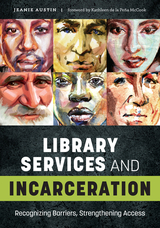 Library Services and Incarceration: Recognizing Barriers, Strengthening Access
Jeanie Austin
American Library Association, 2021 As part of our mission to enhance learning and ensure access to information for all library patrons, our profession needs to come to terms with the consequences of mass incarceration, which have saturated the everyday lives of people in the United States and heavily impacts Black, Indigenous, and people of color; LGBTQ people; and people who are in poverty. Jeanie Austin, a librarian with San Francisco Public Library's Jail and Reentry Services program, helms this important contribution to the discourse, providing tools applicable in a variety of settings. This text covers practical information about services in public and academic libraries, and libraries in juvenile detention centers, jails, and prisons, while contextualizing these services for LIS classrooms and interdisciplinary scholars. It powerfully advocates for rethinking the intersections between librarianship and carceral systems, pointing the way towards different possibilities. This clear-eyed text - begins with an overview of the convergence of library and information science and carceral systems within the United States, summarizing histories of information access and control such as book banning, and the ongoing work of incarcerated people and community members to gain more access to materials;
- examines the range of carceral institutions and their forms, including juvenile detention, jails, immigration detention centers, adult prisons, and forms of electronic monitoring;
- draws from research into the information practices of incarcerated people as well as individual accounts to examine the importance of information access while incarcerated;
- shares valuable case studies of various library systems that are currently providing both direct and indirect services, including programming, book clubs, library spaces, roving book carts, and remote reference;
- provides guidance on collection development tools and processes;
- discusses methods for providing reentry support through library materials and programming, from customized signage and displays to raising public awareness of the realities of policing and incarceration;
- gives advice on supporting community groups and providing outreach to transitional housing;
- includes tips for building organizational support and getting started, with advice on approaching library management, creating procedures for challenges, ensuring patron privacy, and how to approach partners who are involved with overseeing the functioning of the carceral facility; and
- concludes with a set of next steps, recommended reading, and points of reflection.
The Library, Volume I: Books 1–3.9
Apollodorus
Harvard University Press Antiquity’s most influential mythological handbook.
The Library provides in three books a grand summary of traditional Greek mythology and heroic legends. Written in clear and unaffected style, the compendium faithfully follows the Greek literary sources. It is thus an important record of Greek accounts of the origin and early history of the world and their race. This work has been attributed to Apollodorus of Athens (born ca. 180 BC), a student of Aristarchus. But the text as we have it was written by an author probably living in the first or second century of our era.
In his highly valued notes to the Loeb Classical Library edition (which is in two volumes) J. G. Frazer cites the principal passages of other ancient writers where each particular story is told and compares the various versions to those in the Library.
The Library, Volume II: Books 3.10–End. Epitome
Apollodorus
Harvard University Press Antiquity’s most influential mythological handbook.
The Library provides in three books a grand summary of traditional Greek mythology and heroic legends. Written in clear and unaffected style, the compendium faithfully follows the Greek literary sources. It is thus an important record of Greek accounts of the origin and early history of the world and their race. This work has been attributed to Apollodorus of Athens (born ca. 180 BC), a student of Aristarchus. But the text as we have it was written by an author probably living in the first or second century of our era.
In his highly valued notes to the Loeb Classical Library edition (which is in two volumes) J. G. Frazer cites the principal passages of other ancient writers where each particular story is told and compares the various versions to those in the Library.
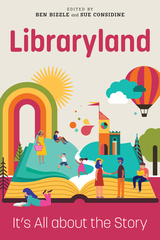 Libraryland: It's All about the Story
Ben Bizzle
American Library Association, 2020 Libraries are community connectors, places where people come together, think together, and learn together. Libraries support and nurture strong, resilient communities. Day in and day out, the library workers at these institutions are doing much more than ensuring equal and equitable access to information; and their impact stretches far beyond the books, programs, and services they facilitate. Featuring contributions from such library leaders as Rebekkah Smith Aldrich, the late Nicolette Sosulski, and Erica Freudenberger, this collection of inspiring first-hand stories from across libraryland spotlights the countless ways in which library staff are making a difference for their communities. A sharing of the hearts, minds, and spirits of library staff from across the country, the uplifting personal narratives in this book include - when a routine reference query inspired a librarian to reach out to a senior patron;
- how a public library’s annual Diwali celebration has strengthened the social fabric of the surrounding community;
- the story of a library that burned down, was hit by a hurricane, got sued twice, and yet still reemerged stronger than ever;
- how the team at the Fayetteville Free Library (FFL) of New York has strategically nurtured a culture of innovation by integrating Syracuse University students into the staff, holding technology “open houses,” and developing other initiatives; and
- the intervention of a public library staff member that helped a mother keep her son enrolled in school and receive his diploma.
Library workers change and save lives every day, and this book is a powerful and nourishing reminder of exactly why libraries are essential.
 The Library's Guide to Graphic Novels
John Ballestro
American Library Association, 2020 The circ stats say it all: graphic novels’ popularity among library users keeps growing, with more being published (and acquired by libraries) each year. The unique challenges of developing and managing a graphics novels collection have led the Association of Library Collections and Technical Services (ALCTS) to craft this guide, presented under the expert supervision of editor Ballestro, who has worked with comics for more than 35 years. Examining the ever-changing ways that graphic novels are created, packaged, marketed, and released, this resource gathers a range of voices from the field to explore such topics as - a cultural history of comics and graphic novels from their World War II origins to today, providing a solid grounding for newbies and fresh insights for all;
- catching up on the Big Two’s reboots: Marvel’s 10 and DC’s 4;
- five questions to ask when evaluating nonfiction graphic novels and 30 picks for a core collection;
- key publishers and cartoonists to consider when adding international titles;
- developing a collection that supports curriculum and faculty outreach to ensure wide usage, with catalogers’ tips for organizing your collection and improving discovery;
- real-world examples of how libraries treat graphic novels, such as an in-depth profile of the development of the Penn Libraries' manga collection;
- how to integrate the emerging field of graphic medicine into the collection; and
- specialized resources like The Cartoonists of Color and Queer Cartoonists databases, the open access scholarly journal Comic Grid, and the No Flying, No Tights website.
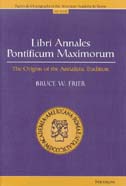 Libri Annales Pontificum Maximorum: The Origins of the Annalistic Tradition
Bruce W. Frier
University of Michigan Press, 1999 Recent years have seen a welcome growth of interest in the history of early Rome. Libri Annales Pontificum Maximorum: the Origins of the Annalistic Tradition contributes important information on this period by focusing on the earliest stages of Roman historical writing. The book is once again available, with a new Introduction by the author that brings the work up to date and helps place it in its current context. This book remains the starting point for study of the pre-annalistic tradition of Roman history.
When first published, the volume sparked a lively debate among classicists and historians of the ancient world. Previous scholarship had often assigned the pontifical chronicle a central role not only in preserving the history of the early Republic, but also in shaping the form of the annalistic tradition. But the author showed that these assumptions rested on insecure foundations; to a large extent, they misrepresented the historiographic development of the annalistic tradition as we know it from, above all, Livy and Dionysius of Halicarnassus.
Perhaps the book's most controversial contention was that the final eighty-book edition of the chronicle, which previous scholars had dated to the later second century BCE, is more probably a massive reworking of materials in the Augustan period. This finding will likely require a considerable revision in our understanding of the development of the annalistic tradition. In the course of making these innovative arguments, the author offers extensive information about the origins of the annalistic tradition and about the early history and historiography of Rome.
Bruce W. Frier is Professor of Classics and Roman Law, and Henry King Ransom Professor of Law, University of Michigan. He has published numerous books and articles on classical and legal topics, and has won the Charles J. Goodwin Award of Merit from the American Philological Association.
Libya After Qaddafi: Lessons and Implications for the Future
Christopher S. Chivvis
RAND Corporation, 2014 The 2011 overthrow of Libyan dictator Muammar Qaddafi by internationally backed rebel groups has left Libya’s new leaders with a number of post-conflict challenges, including establishing security, building political and administrative institutions, and restarting the economy. This report assesses these challenges, the impact of the limited international role in efforts to overcome them, and possible future roles for the international community.
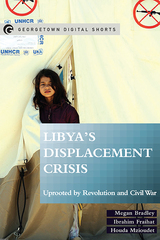 Libya's Displacement Crisis: Uprooted by Revolution and Civil War
Megan Bradley, Ibrahim Fraihat, and Houda Mzioudet
Georgetown University Press Libya faces a bleak humanitarian crisis, the result of the country’s descent into civil war in the summer of 2014 following the 2011 revolution. Hundreds of thousands of Libyan citizens are uprooted within the country and many more are sheltering in neighboring states, particularly Tunisia. Drawing on in-depth interviews with policymakers, practitioners, and displaced Libyans both inside and outside the country, Megan Bradley, Ibrahim Fraihat, and Houda Mzioudet present a brief, yet thoroughly illuminating assessment of the political, socioeconomic, security, humanitarian, and human rights implications of the continued displacement of Libyan citizens within and outside their country. Assessing the complex dimensions and consequences of the situation, Libya’s Displacement Crisis lays the groundwork for what comes next. Acknowledging that the resolution of this crisis hinges on a negotiated end to the Libyan civil war, the authors present ideas to improve assistance strategies and to support durable solutions for displaced Libyans with implications for refugee crises in other parts of the world, including Syria and Iraq. Georgetown Digital Shorts—longer than an article, shorter than a book—deliver timely works of peer-reviewed scholarship in a fast-paced, agile environment. They present new ideas and original texts that are easily and widely available to students, scholars, libraries, and general readers.
License Plate Readers for Law Enforcement: Opportunities and Obstacles
Keith Gierlack
RAND Corporation, 2014 Because license plate reader (LPR) technology is relatively new in the United States, opportunities and obstacles in its use in law enforcement are still under exploration. To examine issues about this technology, RAND conducted interviews with law enforcement personnel, police officers, and others responsible for procuring, maintaining, and operating the systems.
 License to Play: The Ludic in Japanese Culture
Michal Daliot-Bul
University of Hawaii Press, 2014 Play is one of the most powerful cultural forces in contemporary Japan and in other late modern societies. In this notable contribution to our understanding of play, Michal Daliot-Bul explores the intricate and dynamic transformations of culture and play (asobi) in Japan. Along the way, she takes readers on a theoretically informed journey to better comprehend what makes play a significant cultural function, asking such questions as “How can we explain the dialectics between play as a biological instinct and play as a culturally specific activity? What defines the best player? How is creativity related to play? What is the difference between play and playfulness? Are some cultures more play-oriented than others, and if so, why?” Daliot-Bul argues that the cultural meaning of play and its influence on sociocultural life are not inherent properties of a fixed, universal behavior called play but rather are conditioned by changing cultural contexts and competing social ideologies. Spanning Japan’s premodern period to the twenty-first century, the extent and expressions of play described in this book become thought-provoking lenses through which to view Japanese social dynamics and cultural complexities. As she approaches the post-industrialized 1970s in Japan, Daliot-Bul’s narrative also explores urban consumer culture as a system for organizing daily life, the tension between institutional and contemporary popular cultures, the production of new gender identities, and the cultural construction of urban space.
License to Play is an insightful and engaging work that will appeal widely to scholars and students specializing in cultural studies, cultural anthropology, and Japanese studies. Given the global fascination with Japanese popular culture and with play-like pleasures in late consumer cultures, the book will also find a readership among those interested in Japan in general and the universal phenomenon of play.
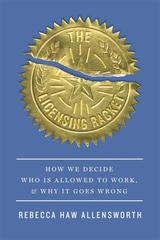 The Licensing Racket: How We Decide Who Is Allowed to Work, and Why It Goes Wrong
Rebecca Haw Allensworth
Harvard University Press, 2025 A bottom-up investigation of the broken system of professional licensing, affecting everyone from hairdressers and morticians to doctors, lawyers, real estate agents, and those who rely on their services.
Tens of millions of US workers are required by law to have a license to do their jobs—about twice as many as are in unions. The requirements are set by over 1,500 industry-specific licensing boards, staffed mainly by volunteers from the industries they regulate. These boards have enormous power to shape the economy and the lives of individuals. As consumers, we rely on licensing boards to maintain standards of hygiene, skill, and ethics. But their decisions can be maddeningly arbitrary, creating unnecessary barriers to work. And where boards could be useful, curbing harms and ensuring professionalism, their performance is profoundly disappointing.
When Rebecca Haw Allensworth began attending board meetings, she discovered a thicket of self-dealing and ineptitude. Drawing on hundreds of hours of interviews with board members and applicants, The Licensing Racket goes behind the scenes to show how boards protect insiders from competition and turn a blind eye to unethical behavior. Even where there is the will to discipline bad actors, boards lack the resources needed to investigate serious cases. The consequences range from the infuriatingly banal—a hairdresser prevented from working—to the deeply shocking, with medical licensing boards bearing considerable blame for the opioid crisis and for staffing shortages during the COVID epidemic. Meanwhile, unethical lawyers who are allowed to keep their licenses are overrepresented among advocates working with the most vulnerable groups in society.
If licensing is in many arenas a pointless obstacle to employment, in others it is as important as it is ineffective. Allensworth argues for abolition where appropriate and outlines an agenda for reform where it is most needed.
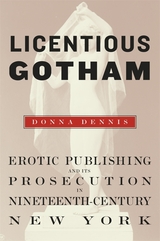 Licentious Gotham: Erotic Publishing and Its Prosecution in Nineteenth-Century New York
Donna Dennis
Harvard University Press, 2009 Licentious Gotham, set in the streets, news depots, publishing houses, grand jury chambers, and courtrooms of the nation’s great metropolis, delves into the stories of the enterprising men and women who created a thriving transcontinental market for sexually arousing books and pictures. The experiences of “fancy” publishers, “flash” editors, and “racy” novelists, who all managed to pursue their trade in the face of laws criminalizing obscene publications, dramatically convey nineteenth-century America’s daring notions of sex, gender, and desire, as well as the frequently counterproductive results of attempts to enforce conventional moral standards.
In nineteenth-century New York, the business of erotic publishing and legal attacks on obscenity developed in tandem, with each activity shaping and even promoting the pursuit of the other. Obscenity prohibitions, rather than curbing salacious publications, inspired innovative new styles of forbidden literature—such as works highlighting expressions of passion and pleasure by middle-class American women. Obscenity prosecutions also spurred purveyors of lewd materials to devise novel schemes to evade local censorship by advertising and distributing their products through the mail. This subterfuge in turn triggered far-reaching transformations in strategies for policing obscenity.
Donna Dennis offers a colorful, groundbreaking account of the birth of an indecent print trade and the origins of obscenity regulation in the United States. By revealing the paradoxes that characterized early efforts to suppress sexual expression in the name of morality, she suggests relevant lessons for our own day.
Lichen Flora of the United States
Bruce Fink
University of Michigan Press, 1935 The Lichen Flora of the United States, first published in 1935, is made available again in answer to numerous requests.
The manual presents a general discussion of the morphology and reproduction of the group. There are descriptions of 1,578 species, varieties, and forms, belonging to 178 genera and 46 families. Keys to the families, genera, and species, 47 plates illustrating 63 species, and an index complete the volume.
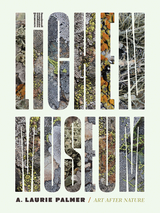 The Lichen Museum
Laurie A. Palmer
University of Minnesota Press, 2023 A radical proposal for how a tiny organism can transform our understanding of human relations
Serving as both a guide and companion publication to the conceptual art project of the same name, The Lichen Museum explores how the physiological characteristics of lichens provide a valuable template for reimagining human relations in an age of ecological and social precarity. Channeling between the personal, the scientific, the philosophical, and the poetic, A. Laurie Palmer employs a cross-disciplinary framework that artfully mirrors the collective relations of lichens, imploring us to envision alternative ways of living based on interdependence rather than individualism and competition. Lichens are composite organisms made up of a fungus and an alga or cyanobacteria thriving in a mutually beneficial relationship. The Lichen Museum looks to these complex organisms, remarkable for their symbiosis, diversity, longevity, and adaptability, as models for relations rooted in collaboration and nonhierarchical structures. In their resistance to fast-paced growth and commodification, lichens also offer possibilities for humans to reconfigure their relationship to time and attention outside of the accelerated pace of capitalist accumulation. Drawing together a diverse set of voices, including personal encounters with lichenologists and lichens themselves, Palmer both imagines and embodies a radical new approach to human interconnection. Using this tiny organism as an emblem through which to navigate environmental and social concerns, this work narrows the gap between the human and natural worlds, emphasizing the notion of mutual dependence as a necessary means of survival and prosperity.
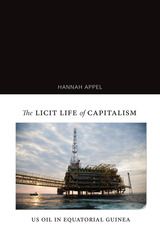 The Licit Life of Capitalism: US Oil in Equatorial Guinea
Hannah Appel
Duke University Press, 2019 The Licit Life of Capitalism is both an account of a specific capitalist project—U.S. oil companies working off the shores of Equatorial Guinea—and a sweeping theorization of more general forms and processes that facilitate diverse capitalist projects around the world. Hannah Appel draws on extensive fieldwork with managers and rig workers, lawyers and bureaucrats, the expat wives of American oil executives and the Equatoguinean women who work in their homes, to turn conventional critiques of capitalism on their head, arguing that market practices do not merely exacerbate inequality; they are made by it. People and places differentially valued by gender, race, and colonial histories are the terrain on which the rules of capitalist economy are built. Appel shows how the corporate form and the contract, offshore rigs and economic theory are the assemblages of liberalism and race, expertise and gender, technology and domesticity that enable the licit life of capitalism—practices that are legally sanctioned, widely replicated, and ordinary, at the same time as they are messy, contested, and, arguably, indefensible.
Lie Algebras and Locally Compact Groups
Irving Kaplansky
University of Chicago Press, 1971 This volume presents lecture notes based on the author's courses on Lie algebras and the solution of Hilbert's fifth problem. In chapter 1, "Lie Algebras," the structure theory of semi-simple Lie algebras in characteristic zero is presented, following the ideas of Killing and Cartan. Chapter 2, "The Structure of Locally Compact Groups," deals with the solution of Hilbert's fifth problem given by Gleason, Montgomery, and Zipplin in 1952.
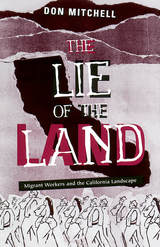 Lie Of The Land: Migrant Workers and the California Landscape
Don Mitchell
University of Minnesota Press, 1996 A hard-hitting look at the story behind California's famous scenery. The beauty of the California landscape is integral to its place in the imagination of generations of people around the world. In The Lie of the Land, geographer Don Mitchell looks at the human costs associated with this famous scenery. Through an account of the labor history of the state, Mitchell examines the material and ideological struggles over living and working conditions that played a large part in the construction of the contemporary California landscape. The Lie of the Land examines the way the California landscape was built on the backs of migrant workers, focusing on migratory labor and agribusiness before World War II. The book relates the historical geography of California to the processes of labor that made it, discussing not only significant strikes but also on the everyday existence of migrant workers in the labor camps, fields, and “Hoovervilles” where they lived. Mitchell places class struggle at the heart of social development, demonstrating concretely how farm workers affected their social and material environment, as well as exploring how farm owners responded to their workers’ efforts to improve their living and working conditions. Mitchell also places “reformers” in context, revealing the actual nature of their role in relation to migrant workers’ efforts—that of undermining the struggle for genuine social change. In addition, this volume captures the significance of the changing composition of the agricultural workforce, particularly in racial terms, as the class struggle evolved over a period of decades. Mitchell has written a narrative history that describes the intimate connection between landscape representations and the material form of geography. The Lie of the Land places people squarely in the middle of the landscapes they inhabit, shedding light on the complex and seemingly contradictory interactions between progressive state agents, radical workers, and California growers as they seek to remake the land in their own image.
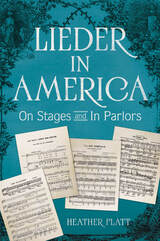 Lieder in America: On Stages and In Parlors
Heather Platt
University of Illinois Press, 2023 Lieder and the rise of song recital in the United States, 1850–1914 Though viewed as quintessentially German, lieder became a centerpiece of nineteenth century song recitals in the United States. By the 1890s, these songs, which were often sung in English, were a sensation among tutored and untutored music lovers alike. Heather Platt examines the varied supporters and singers who both established the lied as a concert repertoire and shaped a new kind of recital dedicated to art songs. Lieder were embraced and spread by performers like Max Heinrich and advocates like John Sullivan Dwight, as well as by the women’s clubs that flourished nationwide. At the same time as examining the critical reception of the artists and songs, Platt reveals ways in which US recital programs anticipated trends in European recitals. She also places lieder against the backdrop of the time, when factors like the growth in the sheet music industry, the evolution of American art song, and emerging anti-German feeling had a profound impact on the genre’s popularity.
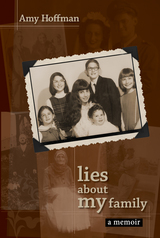 Lies About My Family: A Memoir
Amy Hoffman
University of Massachusetts Press, 2013 This well-crafted family memoir is about the stories that are told and the ones that are not told, and about the ways the meanings of the stories change down the generations. It is about memory and the spaces between memories, and about alienation and reconciliation.
All of Amy Hoffman's grandparents came to the United States during the early twentieth century from areas in Poland and Russia that are now Belarus and Ukraine. Like millions of immigrants, they left their homes because of hopeless poverty, looking for better lives or at the least a chance of survival. Because of the luck, hard work, and resourcefulness of the earlier generations, Hoffman and her five siblings grew up in a middle-class home, healthy, well fed, and well educated. An American success story? Not quite—or at least not quite the standard version. Hoffman's research in the Ellis Island archives along with interviews with family members reveal that the real lives of these relatives were far more complicated and interesting than their documents might suggest.
Hoffman and her siblings grew up as observant Jews in a heavily Catholic New Jersey suburb, as political progressives in a town full of Republicans, as readers in a school full of football players and their fans.
As a young lesbian, she distanced herself from her parents, who didn't understand her choice, and from the Jewish community, with its organization around family and unquestioning Zionism. However, both she and her parents changed and evolved, and by the end of this engaging narrative, they have come to new understandings, of themselves and one another.
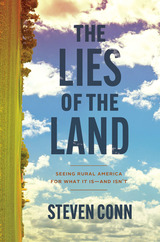 The Lies of the Land: Seeing Rural America for What It Is—and Isn’t
Steven Conn
University of Chicago Press, 2023 A "piercing, unsentimental" (New Yorker) history that boldly challenges the idea of a rural American crisis.
It seems everyone has an opinion about rural America. Is it gripped in a tragic decline? Or is it on the cusp of a glorious revival? Is it the key to understanding America today? Steven Conn argues that we’re missing the real question: Is rural America even a thing? No, says Conn, who believes we see only what we want to see in the lands beyond the suburbs—fantasies about moral (or backward) communities, simpler (or repressive) living, and what it means to be authentically (or wrongheadedly) American. If we want to build a better future, Conn argues, we must accept that these visions don’t exist and never did.
In The Lies of the Land, Conn shows that rural America—so often characterized as in crisis or in danger of being left behind—has actually been at the center of modern American history, shaped by the same forces as everywhere else in the country: militarization, industrialization, corporatization, and suburbanization. Examining each of these forces in turn, Conn invites us to dispense with the lies and half-truths we’ve believed about rural America and to pursue better solutions to the very real challenges shared all across our nation.
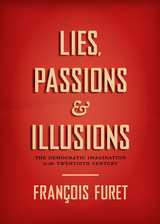 Lies, Passions, and Illusions: The Democratic Imagination in the Twentieth Century
François Furet
University of Chicago Press, 2014 François Furet needs little introduction. Widely considered one of the leading historians of the French Revolution, he was a maverick for his time, shining a critical light on the entrenched Marxist interpretations that prevailed during the mid-twentieth century. Shortly after his death in 1997, the New York Review of Books called him “one of the most influential men in contemporary France.” Lies, Passions, and Illusions is a fitting capstone to this celebrated author’s oeuvre: a late-career conversation with philosopher Paul Ricoeur on the twentieth century writ large, a century of violence and turmoil, of unprecedented wealth and progress, in which history advanced, for better or worse, in quantum leaps. This conversation would be, sadly, Furet’s last—he died while Ricoeur was completing his edits. Ricoeur did not want to publish his half without Furet’s approval, so what remains is Furet’s alone, an astonishingly cohesive meditation on the political passions of the twentieth century. With strokes at once broad and incisive, he examines the many different trajectories that nations of the West have followed over the past hundred years. It is a dialogue with history as it happened but also as a form of thought. It is a dialogue with his critics, with himself, and with those major thinkers—from Tocqueville to Hannah Arendt—whose ideas have shaped our understanding of the tragic dramas and upheavals of the modern era. It is a testament to the crucial role of the historian, a reflection on how history is made and lived, and how the imagination is a catalyst for political change. Whether new to Furet or deeply familiar with his work, readers will find thought-provoking assessments on every page, a deeply moving look back at one of the most tumultuous periods of history and how we might learn and look forward from it.
Lies to Live By
Lois Beardslee
Michigan State University Press, 2003 Lies To Live By brings together two selections of stories by Ojibwe storyteller Lois Beardslee. “Lies to Live By,” a series of interdependent tales, reflects the storyteller’s role in interpreting traditional stories for contemporary audiences, while preserving traditions based not in mysticism but in pragmatism. In “Calm Days,” three generations—the narrator, her grandfather, and her son—spend a week together on a remote island during the course of which they demonstrate the continuity of Ojibwe life. Together these stories weave the contemporary and the traditional to show how cultural diversity can be preserved even as cultural boundaries are transcended.
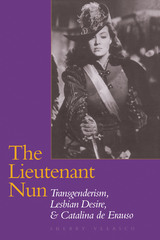 The Lieutenant Nun: Transgenderism, Lesbian Desire, and Catalina de Erauso
By Sherry Velasco
University of Texas Press, 2001 Catalina de Erauso (1592-1650) was a Basque noblewoman who, just before taking final vows to become a nun, escaped from the convent at San Sebastián, dressed as a man, and, in her own words, "went hither and thither, embarked, went into port, took to roving, slew, wounded, embezzled, and roamed about." Her long service fighting for the Spanish empire in Peru and Chile won her a soldier's pension and a papal dispensation to continue dressing in men's clothing. This theoretically informed study analyzes the many ways in which the "Lieutenant Nun" has been constructed, interpreted, marketed, and consumed by both the dominant and divergent cultures in Europe, Latin America, and the United States from the seventeenth century to the present. Sherry Velasco argues that the ways in which literary, theatrical, iconographic, and cinematic productions have transformed Erauso's life experience into a public spectacle show how transgender narratives expose and manipulate spectators' fears and desires. Her book thus reveals what happens when the private experience of a transgenderist is shifted to the public sphere and thereby marketed as a hybrid spectacle for the curious gaze of the general audience.
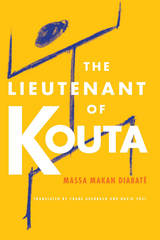 The Lieutenant of Kouta
Massa Makan Diabaté
Michigan State University Press, 2017 The Lieutenant of Kouta is the first novel in Massa Makan Diabaté’s award-winning trilogy. Featuring an introduction by leading Diabaté scholar Cheick M. Chérif Keïta and Shane Auerbach, it tells the story, part tragicomic and part hagiographic, of an African lieutenant in the French Army who returns as a decorated hero from the battlefields of Europe to Kouta, a fictionalized version of the author’s own birthplace, the Malian town of Kita. Upon his return, Siriman Keita finds it difficult to adjust to village life as he navigates traditional customs in his attempts to create his place in the predominantly Muslim Kouta. The novel offers a rich and nuanced representation of Mali on the brink of independence; it is a tapestry of traditional Mandinka society and the French colonial apparatus, illustrating the dynamic interplay between the two. This text is, ultimately, a story of one man’s transformation coinciding with that of his country.
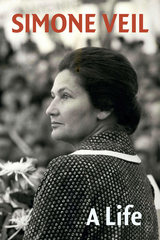 A Life
Simone Veil
Haus Publishing, 2009 Simone Veil, the former French lawyer and politician who became the first President of the European Union, was born Simone Jacob in 1927. In A Life, she describes in vivid detail a childhood of happiness and innocence spent in Nice that came to an abrupt end in 1944 when, at the age of 17, she was deported with her family to concentration camps. Though she survived, her mother, father, and brother all died in captivity. After the liberation of Auschwitz and upon her return to France, Veil studied law and political science and later became Minister for Health under the government of Jacques Chirac. It was there that she fought a successful political battle to introduce a law legalizing abortion in France. She was elected the first female President of the European Parliament and later returned to French government as Minister for Social Affairs. Over her many years of service, Veil was a bastion of social progress and a powerful individual symbol for the advancement of women’s rights around the world.
Veil was one of France’s most beloved public figures, most admired for her personal and political courage. Her memoir, published here in English for the first time, is a sincere and candid account of an extraordinary life and career, reflecting both her humanity and her determination to improve social standards at home and maintain economic and political stability in Europe. In the wake of her passing in 2017, this translation of her memoir stands as a fitting tribute to an unparalleled life of survival, selflessness, and unwavering public service.
|
|